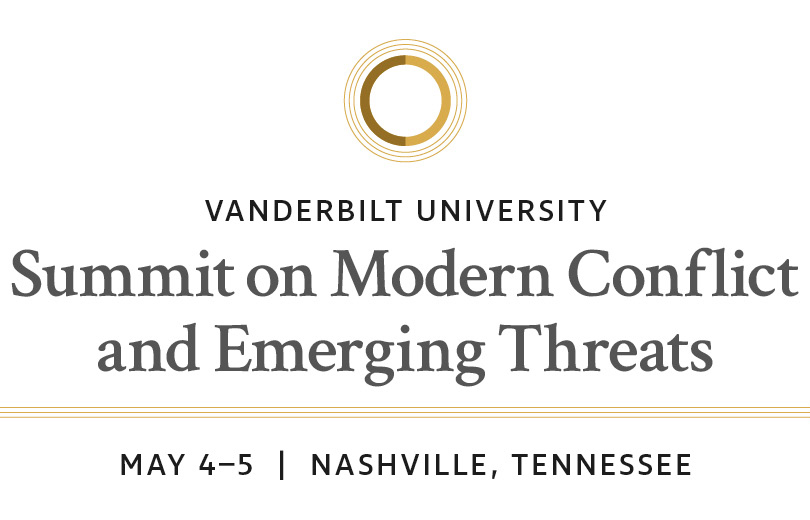
Warning: count(): Parameter must be an array or an object that implements Countable in /var/www/dev.vanderbilt.edu/wordpress/wp-content/plugins/futurevu-bb-modules/futurevu-link-list/includes/frontend.php on line 16
Warning: Invalid argument supplied for foreach() in /var/www/dev.vanderbilt.edu/wordpress/wp-content/plugins/futurevu-bb-modules/futurevu-link-list/includes/frontend.php on line 17
Table of Contents
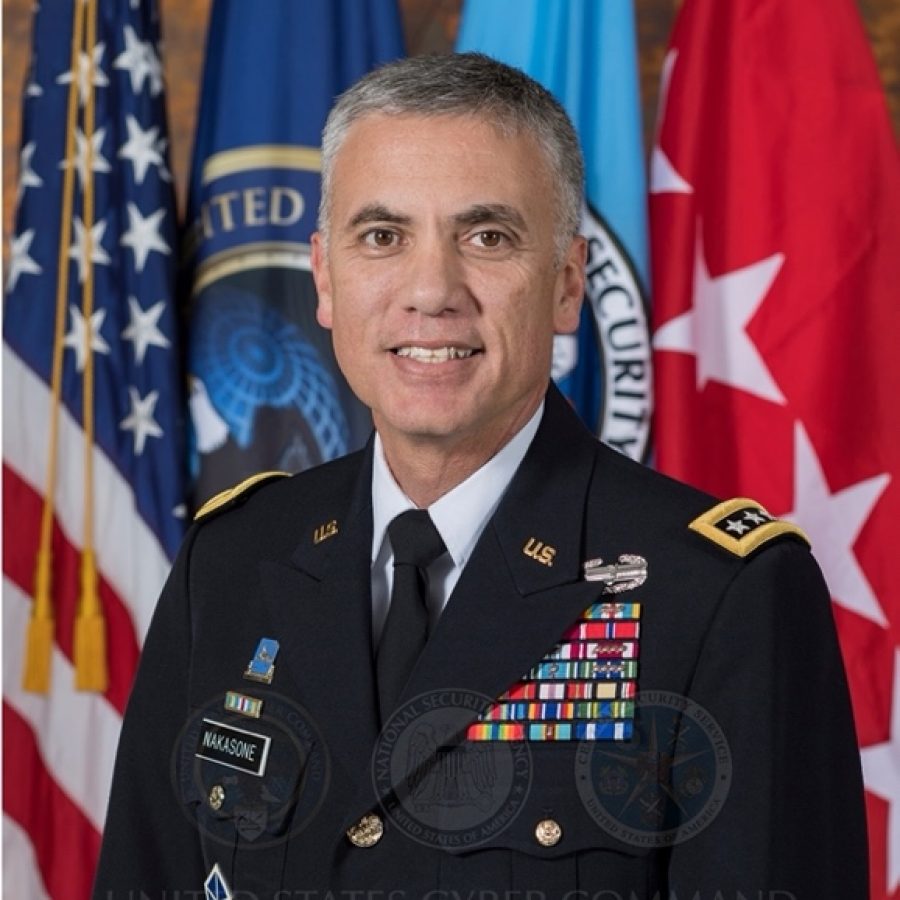
Keynote Speaker: General Paul Nakasone
United States Army, Commander, United States Cyber Command, Director, National Security Agency/Chief, Central Security Service
Keynote: May 4, 9:45 a.m.
General Paul M. Nakasone assumed his present duties as Commander, U.S. Cyber Command and Director, National Security Agency/Chief, Central Security Service in May 2018.
He previously commanded U.S. Army Cyber Command from October 2016 - April 2018.
A native of White Bear Lake, Minnesota, GEN Nakasone is a graduate of Saint John's University in Collegeville, Minnesota, where he received his commission through the Reserve Officers' Training Corps.
GEN Nakasone has held command and staff positions across all levels of the Army with assignments in the United States, the Republic of Korea, Iraq, and Afghanistan.
GEN Nakasone commanded the Cyber National Mission Force at U.S. Cyber Command. He has also commanded a company, battalion, and brigade, and served as the senior intelligence officer at the battalion, division and corps levels.
GEN Nakasone has served in Joint and Army assignments in the United States, the Republic of Korea, Iraq, and Afghanistan. His most recent overseas posting was as the Director of Intelligence, J2, International Security Assistance Force Joint Command in Kabul, Afghanistan.
GEN Nakasone has also served on two occasions as a staff officer on the Joint Chiefs of Staff.
GEN Nakasone is a graduate of the U.S. Army War College, the Command and General Staff College, and Defense Intelligence College. He holds graduate degrees from the U.S. Army War College, the National Defense Intelligence College, and the University of Southern California.
GEN Nakasone's awards and decorations include the Distinguished Service Medal (with oak leaf cluster), the Defense Superior Service Medal (with three oak leaf clusters), Legion of Merit, Bronze Star, Defense Meritorious Service Medal (with oak leaf cluster), Army Commendation Medal, Joint Service Achievement Medal (with oak leaf cluster), Army Achievement Medal (with four oak leaf clusters), Joint Meritorious Unit Award, Iraq Campaign Medal, Afghanistan Campaign Medal, Combat Action Badge, and the Joint Chiefs of Staff Identification Badge.
GEN Nakasone and his wife are the proud parents of four children, who form the nucleus of “Team Nakasone.”
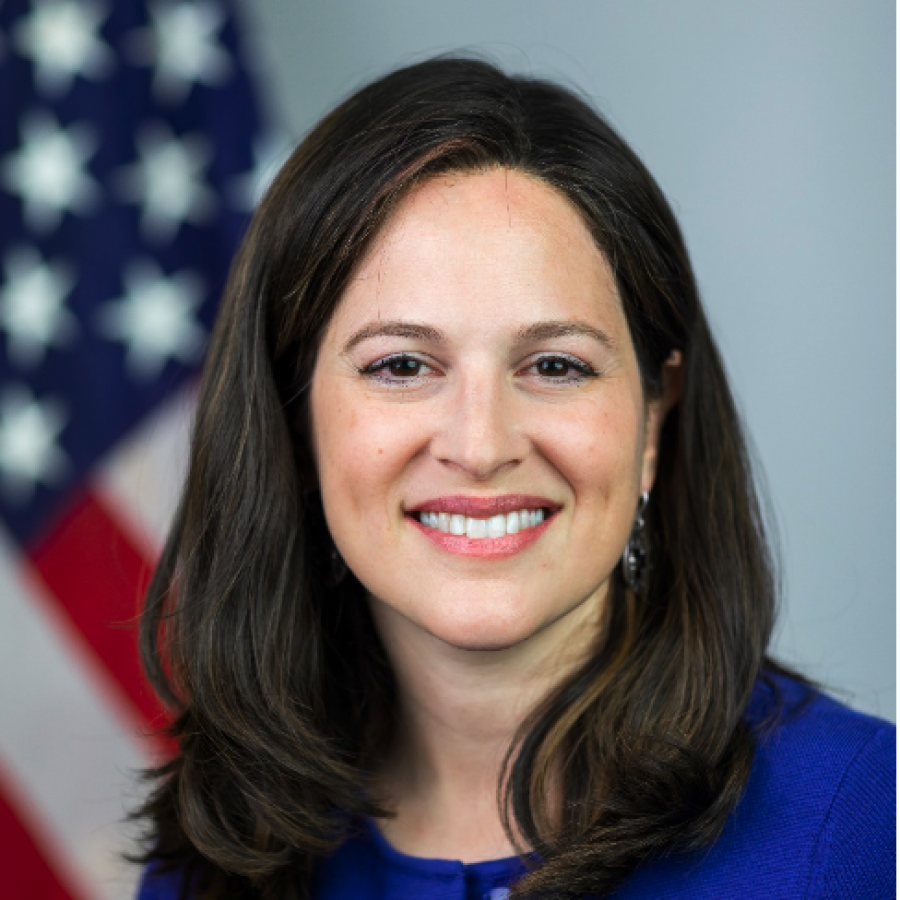
Speaker: Anne Neuberger
Deputy Assistant to the President & Deputy National Security Advisor for Cyber & Emerging Technology
Video Address: Perspectives from the Deputy National Security Advisor, Cyber & Emerging Tech (May 4, 2:45 p.m.)
Ms. Neuberger is the Deputy Assistant to the President and Deputy National Security Advisor for Cyber and Emerging Technology on the National Security Council. Previously, she served as the National Security Agency’s (NSA) Director of Cybersecurity, where she led NSA’s cybersecurity mission, including emerging technology areas like quantum- resistant cryptography. Prior to this role, Ms. Neuberger led NSA’s election security effort and served as Assistant Deputy Director of NSA’s Operations Directorate, overseeing foreign intelligence and cybersecurity operations. She also served as NSA’s first Chief Risk Officer, Director of NSA’s Commercial Solutions Center, Director of the Enduring Security Framework cybersecurity public-private partnership, and the Department of the Navy’s Deputy Chief Management Officer. In 2017, Ms. Neuberger was awarded a Presidential Rank Award for her service at the NSA. Before her Government service, Ms. Neuberger was Senior Vice President of Operations at American Stock Transfer and Trust Company, where she directed technology and operations.

Speaker: Kersti Kaljulaid
Former President of the Republic of Estonia, Global Advocate for Every Woman Every Child
Session: Fireside Chat (May 5, 9:45 a.m)
Kersti Kaljulaid served as the President of the Republic of Estonia from 2016-2021. During her time in office, she made her presence felt in both her homeland and the international arena.
Previously she had been serving as a Member of the European Court of Auditors, advising Prime Minister Mart Laar and holding diferent top level positions in energy, investment banking and telecom sector. Genetic engineer and economist by education, she has been a member of the Supervisory Board of the Estonian Genome Center and the Council Chair of the University of Tartu from 2012 to 2016.
In summer 2021, UN Secretary-General Antonio Guterres appointed President Kaljulaid to the position of Global Advocate for the ‘Every Woman Every Child’ strategy on the health and well- being of women, children and adolescents around the world for the next two years. She was also the first Estonian to be featured in the Forbes World's 100 Most Powerful Women.
Kersti Kaljulaid has become a sought-after speaker at high-level forums on digital, security and foreign-policy topics and more broadly for analysing and interpreting societal and economic change.
President Kaljulaid is a vocal advocate of human rights, rule of law, freedom of speech and democracy. One of the principles in the in office of president has been the one she set out upon her inauguration: “I am never silent when our security is in question, when our freedoms are at stake or when those weaker than us are treated unjustly.
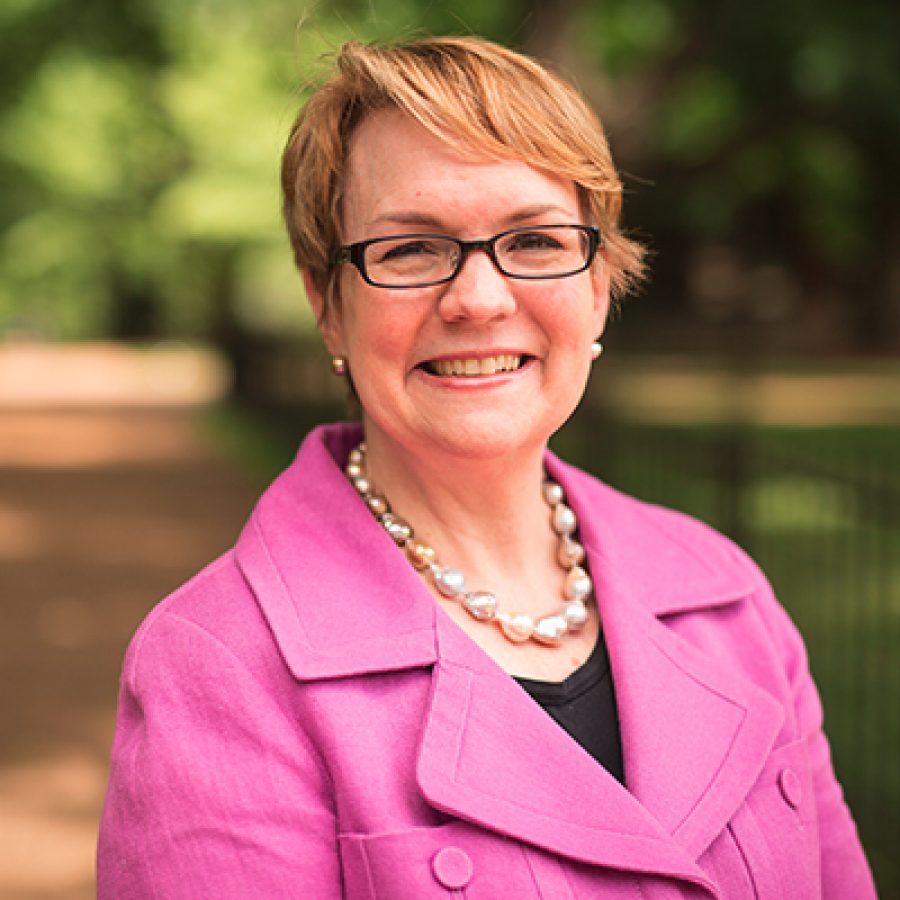
Session Chair: Vanessa Beasley
Vice Provost for Academic Affairs, Dean of Residential Faculty, Associate Professor of Communication Studies, Vanderbilt University
Session: Complexities of Coverage in Modern Conflict and Emerging Threats (May 5, 12:00 p.m.)
Vanessa Beasley, a Vanderbilt University alumna and expert on the history of U.S. political rhetoric, is vice provost for academic affairs, dean of residential faculty and an associate professor of communication studies. As Vice Provost and Dean of Residential Faculty, she oversees Vanderbilt’s growing Residential College System as well as the campus units that offer experiential learning inside and outside of the classroom.
Beasley attended Vanderbilt as an undergraduate and earned a bachelor of arts in speech communication and theatre arts. She also holds a Ph.D. in speech communication from the University of Texas at Austin.
Following stints on the faculty of Texas A&M University, Southern Methodist University and the University of Georgia, she returned to Vanderbilt in 2007 as a faculty member in the Department of Communication Studies. Active in the Vanderbilt community, she has served as chair of the Provost’s Task Force on Sexual Assault, director of the Program for Career Development for faculty in the College of Arts and Science, and as a Jacque Voegeli Fellow of the Robert Penn Warren Center for the Humanities.
Beasley’s areas of academic expertise include the rhetoric of American presidents, political rhetoric on immigration, and media and politics. She is the author of numerous scholarly articles, book chapters and other publications, and is the author of two books, Who Belongs in America? Presidents, Rhetoric, and Immigration and You, the People: American National Identity in Presidential Rhetoric, 1885-2000.
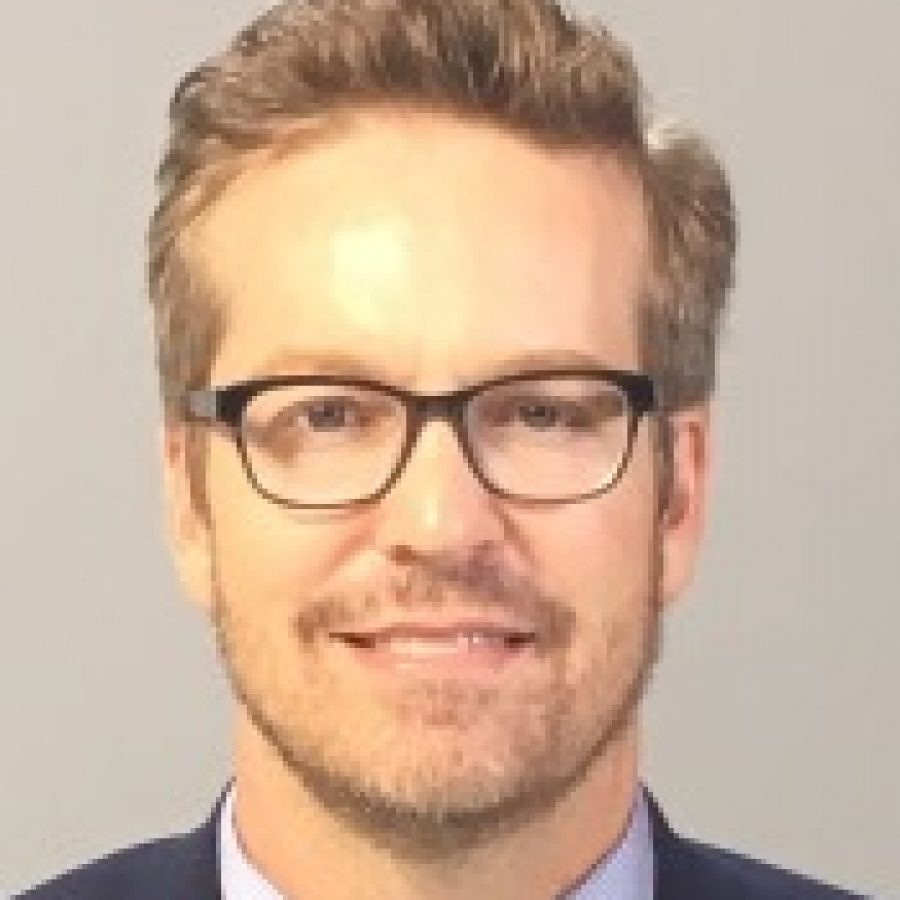
Session Chair: Brett Benson
Associate Professor of Political Science and Asian Studies, Vanderbilt University
Session: Fireside Chat with Kersti Kaljulaid, former president of Estonia (May 5, 9:45 a.m.)
Brett V. Benson is an Associate Professor of Political Science and Asian Studies at Vanderbilt University. His research interests lie in the areas of international relations and Chinese politics and East Asian relations. He has worked on military alliances and interstate conflict and is the author of Constructing International Security: Alliances, Deterrence, and Moral Hazard (Cambridge University Press, 2012). His current research focuses on the role of weapons systems in international politics. In particular, he is studying nuclear weapons and strategies countries use to reduce proliferation, the relationship between the sale of conventional weapons and military alliances, and the effects of small arms markets on intrastate conflicts. In addition to his work on international relations topics, he is also involved in a project that examines the effect of religious bias on voters’ decisions in the US presidential election.
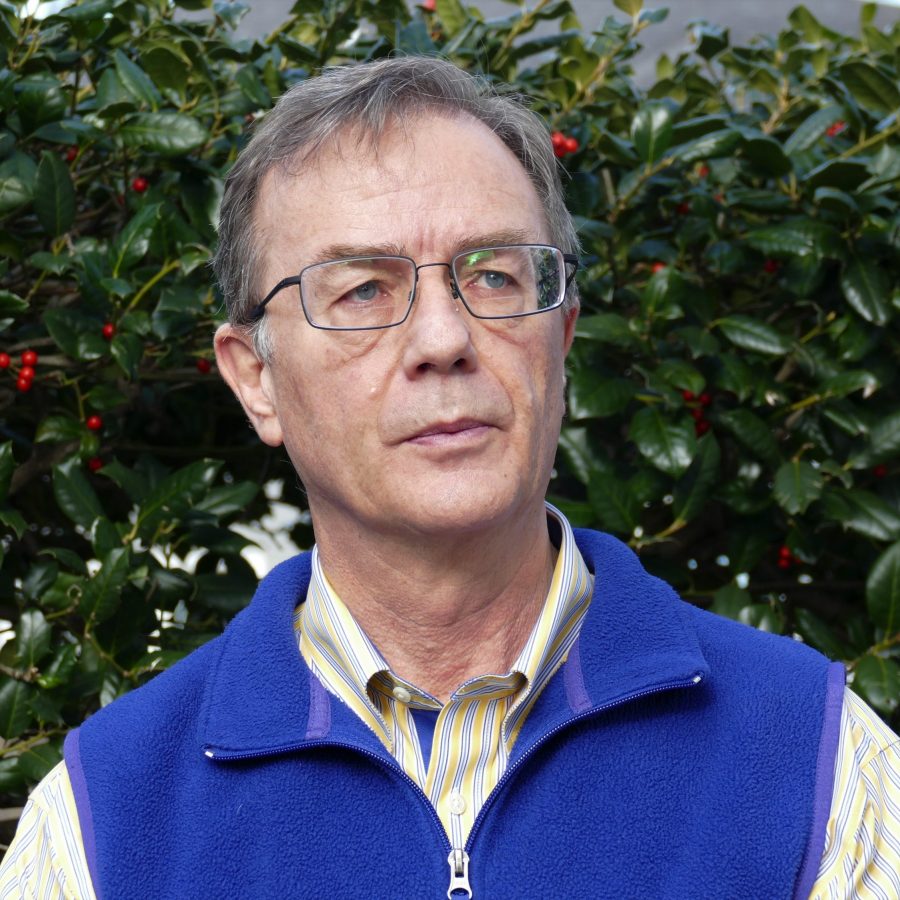
Panelist: Michael Bess
Chancellor’s Professor of History at Vanderbilt University
Session: Interdisciplinary Approaches to Modern Conflict (May 4, 1:45 p.m.)
Michael Bess, Chancellor’s Professor of History at Vanderbilt, is a specialist in 20th- and 21st-century Europe, with a particular interest in the interactions between social and cultural processes and technological change. His fifth and most recent book is Planet in Peril: Humanity’s Four Greatest Challenges and How We Can Overcome Them (Cambridge University Press, October 2022). This study focuses on the existential risks posed by climate change, nuclear weapons, pandemics (natural or bioengineered), and artificial intelligence – surveying the solutions that have been tried, and why they have fallen short thus far. Bess describes a pathway for gradually modifying the United Nations over the coming century so that it becomes more effective at coordinating global solutions.
Bess has been a Guggenheim Fellow (2009), and has received grants from the American Council of Learned Societies, the National Institutes of Health / National Human Genome Research Institute, the John D. and Catherine T. MacArthur Foundation, the Fulbright research grants program, the Woodrow Wilson National Fellowship Foundation, and the University of California’s Institute on Global Conflict and Cooperation. Bess received his Ph.D in History from U.C. Berkeley in 1989, and has been teaching at Vanderbilt ever since. He has been awarded the Nordhaus Award for Excellence in Undergraduate Teaching, the Ingalls Award for Excellence in Classroom Teaching, and the Chair of Teaching Excellence.
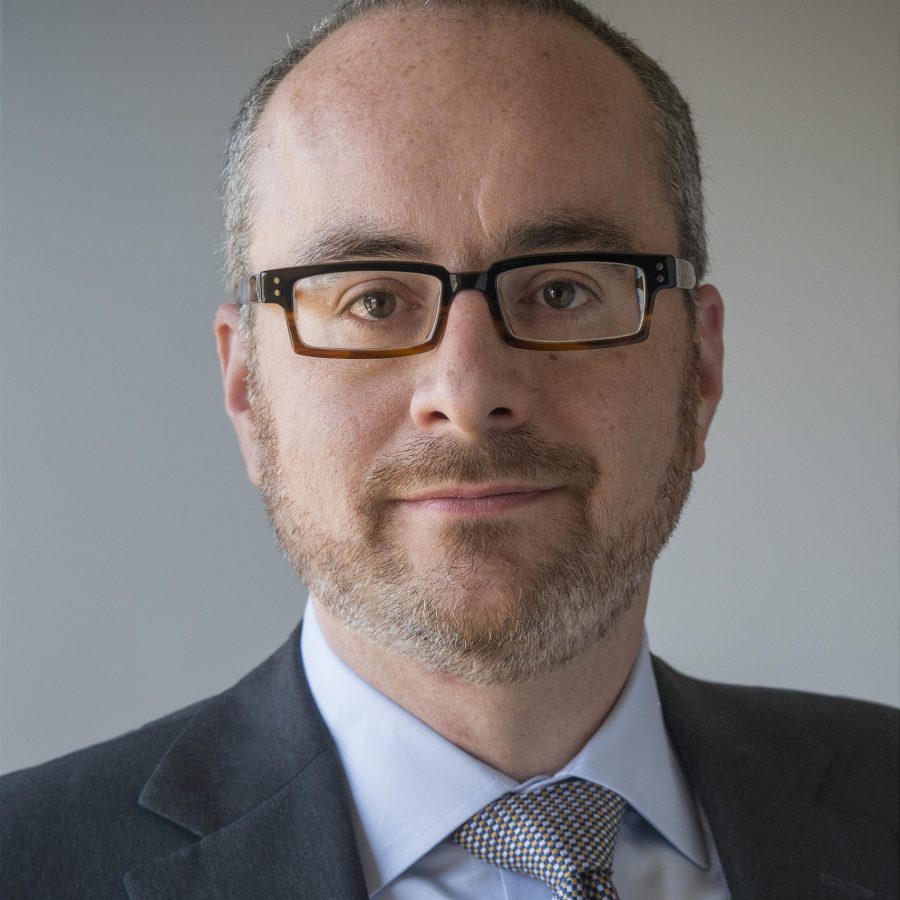
Panelist: Ethan Bueno de Mesquita
Sydney Stein Professor and Deputy Dean, Harris School of Public Policy at the University of Chicago
Session: Complexities of Cyber Attribution (May 4, 11:00 a.m.)
Ethan Bueno de Mesquita is the Sydney Stein Professor and Deputy Dean at the Harris School of Public Policy at the University of Chicago. He is an applied game theorist who has written broadly on terrorism and rebellion, cyber strategy, electoral accountability, and social science methodology.
Bueno de Mesquita is the author or co-author of Political Economy for Public Policy, Theory and Credibility, and Thinking Clearly with Data (all from Princeton University Press), as well as numerous academic articles in both political science and economics.
Bueno de Mesquita has been a Lady Davis Fellow at the Hebrew University of Jerusalem. His research has been supported by the National Science Foundation, the Office of Naval Research, and the United States Institute of Peace. He has written for a wide variety of media and intellectual outlets, including the Boston Review, Chicago Tribune, Foreign Policy, The National Interest, and War on the Rocks. And he advises senior tech industry leaders on issues at the intersection of tech, governance, and society.
Before coming to the University of Chicago, Bueno de Mesquita taught in the political science department at Washington University in St. Louis. He received his BA from the University of Chicago in 1996 and his MA and PhD from Harvard University in 2003.
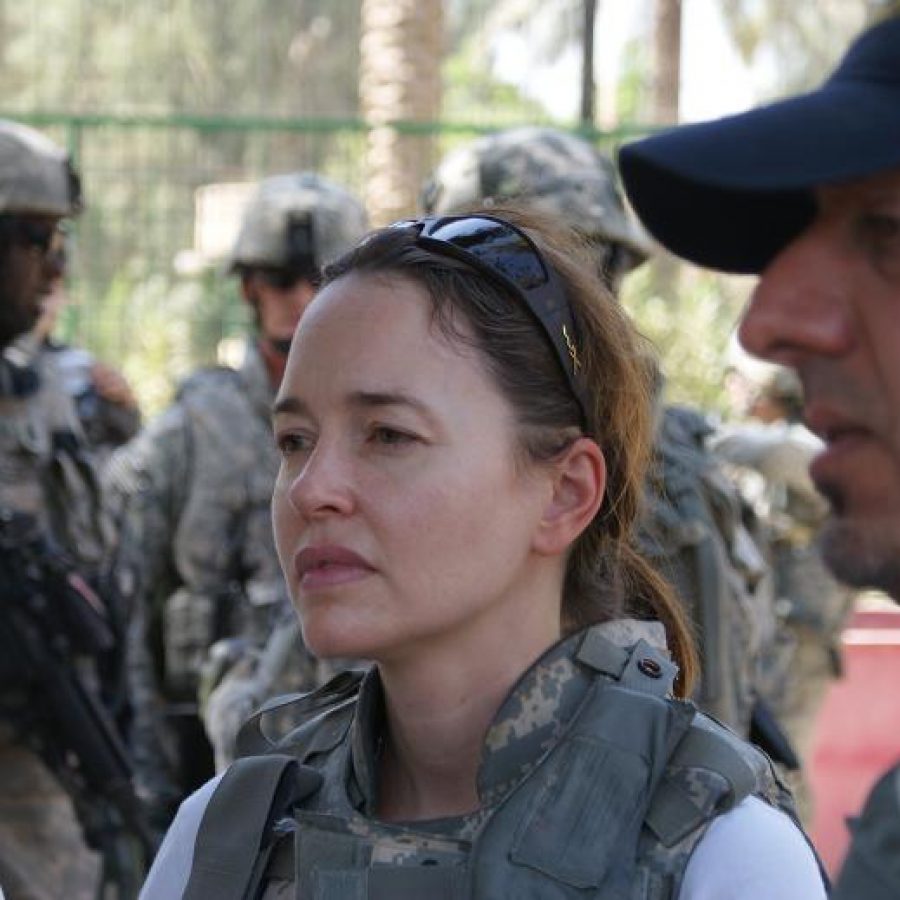
Panelist: Katherine Blue Carroll
Associate Professor of Political Science, Associate Director of Public Policy Studies, Vanderbilt University
Session: Entering the Grey Zone: The Changing Face of Conflict (May 5, 10:30 a.m.)
Katherine Carroll began her career at Vanderbilt in 2001 as Assistant Dean of the College of Arts and Science. Today she is a non-tenure track Associate Professor of Political Science and the Associate Director of Vanderbilt's Program in Public Policy Studies. During 2008 and 2009 she took a leave from Vanderbilt to serve as a social scientist for the Human Terrain Team program in Baghdad, Iraq. At Vanderbilt she teaches courses on the U.S. military, the Middle East, the war in Iraq, terrorism, and comparative politics. Her dissertation was published as Business as Usual? Economic Reform in Jordan (Lexington Press, 2003). She has also published articles on Iraqi tribes and the cultural interaction of U.S. soldiers and Iraqis during the war. Her most recent project is an introductory textbook for undergraduates called Understanding the U.S. Military (Routledge, August 2022), which she both contributed to and co-edited with Major General William Hickman (U.S. Army retired).
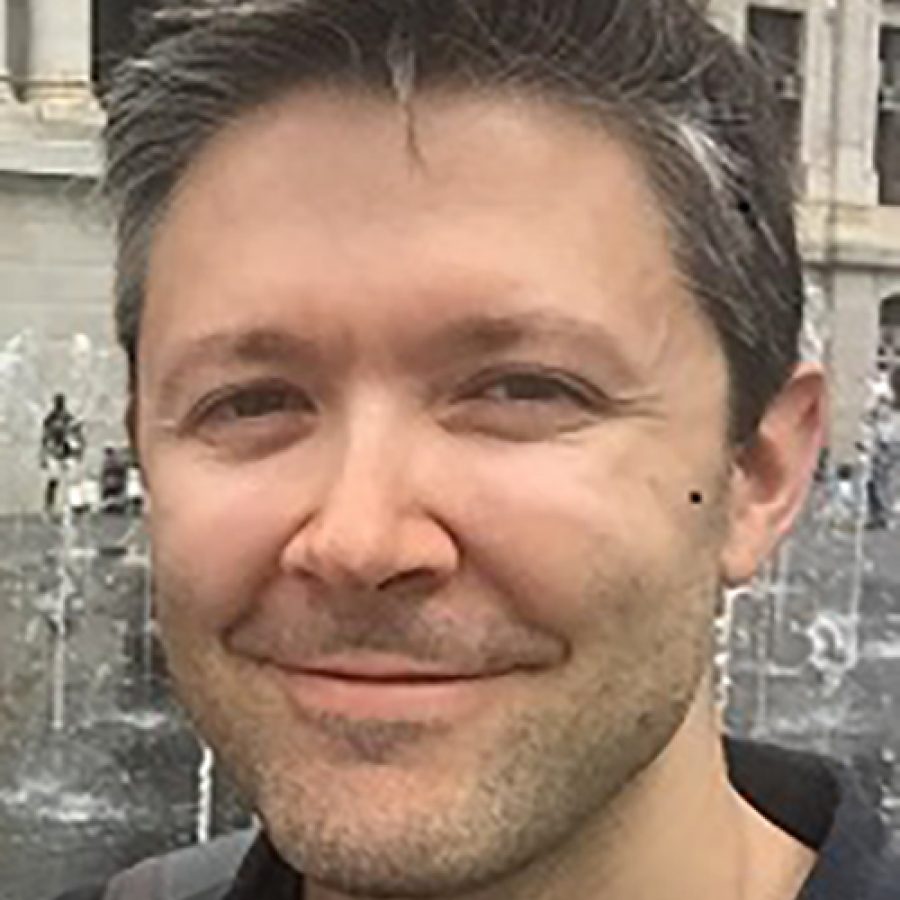
Panelist: Andrew Coe
Assistant Professor of Political Science and Director of the Laboratory for Research on Conflict and Collective Action (ROCCA Lab) at Vanderbilt University
Session:Entering the Grey Zone: The Changing Face of Conflict, (May 5, 10:30 a.m.)
Andrew Coe is an Assistant Professor of Political Science and also Director of the Laboratory for Research on Conflict and Collective Action (ROCCA Lab) at Vanderbilt University. His work is devoted to understanding the causes and consequences of violent conflict in human civilization. His research involves the development and analysis of game-theoretic models of various aspects of conflict, often drawing on the principles of economic theory and his experience working for the U.S. government on national security policy. Professor Coe has taught a variety of courses, whose subject matter ranges across psychology, economics, political science, policy analysis, and a bit of evolutionary biology. Before becoming a professor, he was a fellow at the Council on Foreign Relations and worked for the Institute for Defense Analyses.
Panelist: Joyce Corell
Deputy National Cyber Director, Technology & Ecosystem Security, Office of the National Cyber Director, Executive Office of the President
Session: Interdisciplinary Approaches to Modern Conflict (May 4, 1:45 p.m.)
Ms. Corell joined the newly created Office of the National Cyber Director, Executive Office of the President in September 2021 as the Acting Deputy National Cyber Director for Technology and Ecosystem Security. Prior to this posting she was the Assistant Director for Supply Chain and Cyber, National Counterintelligence and Security Center (NCSC), Office of the Director of National Intelligence (ODNI). Ms. Corell has been an ODNI employee for 10 years following 23 years at the National Security Agency. Ms. Corell spent a significant portion of her career on various aspects of computer network operations from capability development to the development of national policy and legislation. Complementing these roles, Ms. Corell also led various activities surrounding partnerships with the private sector ranging from technology transfer, export licensing and the development of strategic alliances both domestic and international.
Ms. Corell graduated from William & Mary with a BA in Political Science. She also received an MS in National Security Strategy from the National War College.

Keynote Speaker: Dr. James Crowe
Director, Vanderbilt Vaccine Center and Ann Scott Carell Professor of Pediatrics, Pathology, Microbiology and Immunology at Vanderbilt University Medical Center
Keynote: Epidemic Acceleration: Why It’s Happening and What We Can Do About It, May 5, 1:15 p.m.
Dr. Crowe is Director of the Vanderbilt Vaccine Center and the Ann Scott Carell Professor of Pediatrics, Pathology, Microbiology and Immunology at Vanderbilt University Medical Center. He is a board-certified pediatric infectious diseases physician and viral immunology researcher. His laboratory studies the human immune response to infection for a wide variety of major human pathogens, including many emerging infections. His research group uses a very broad array of techniques including molecular and cellular biology, state-of-the-art imaging and flow cytometry, bioinformatics, and bioengineering approaches to attack scientific problems at the forefront of immunity research. He is an elected member of the National Academy of Medicine and National Academy of Inventors, is an ISI Highly Cited Researcher and has been the recipient of numerous investigator awards including the 2019 Merck Future Insight Prize, 2020 AAAS Golden Goose Award, the 2022 Harrington Prize for Innovation in Medicine, and others. Many vaccine candidates and human monoclonal antibodies developed during his team’s research have been tested in Phase I-III clinical trials in humans, including tixagevimab + cilgavimab (Evusheld) that obtained EUA from the US FDA for preventing COVID-19 and has been given to over a million patients in the US, Europe, Middle East, Africa and Australia.
Dr. Crowe attended Davidson College in NC where he obtained a BS, followed by medical school and pediatrics residency at UNC Chapel Hill. He trained for five years as a postdoctoral fellow in virology, immunology, and vaccine sciences in the NIH intramural program in Bethesda, MD with Robert Chanock, a National Academy member and the most notable protégé of Albert Sabin. Five of the live attenuated vaccines for respiratory syncytial virus (RSV) Dr. Crowe made at the NIH have been tested in Phase I and II clinical trials. At Vanderbilt, he completed a fellowship in Pediatric Infectious Diseases.
He also is Founder of the biotech company IDBiologics and Chairman and Chief Scientific Officer of the nonprofit Global Pandemic Prevention and Biodefense Center, home of the AHEAD100 initiative to discover and stockpile human monoclonal antibodies for the 100 most likely causes of future epidemics.
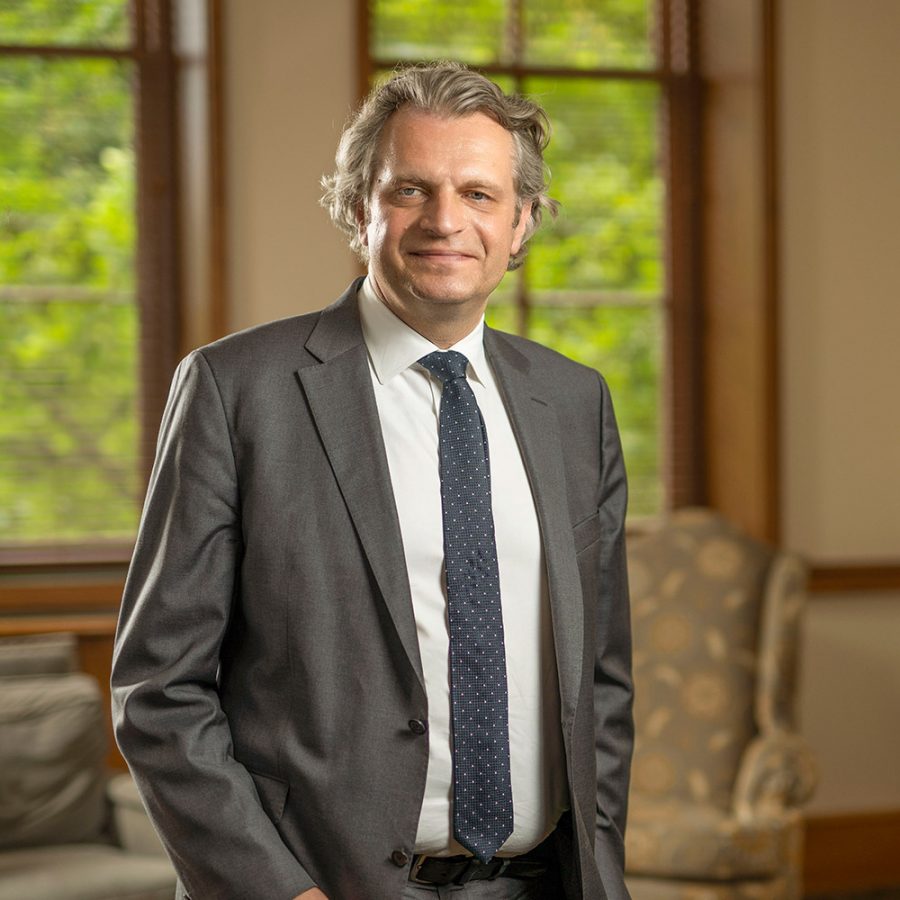
Speaker and Panelist: Daniel Diermeier
Chancellor of Vanderbilt University
Opening remarks (May 4, 9:35 a.m.; May 5, 9:30 a.m.)
Session: Interdisciplinary Approaches to Modern Conflict (May 4, 1:45 p.m.)
An internationally renowned political scientist and management scholar, Daniel Diermeier is the ninth chancellor of Vanderbilt University.
Diermeier is a fellow of the American Academy of Arts and Sciences, the Guggenheim Foundation and the Canadian Institute for Advanced Research. He has published four books and more than 100 research articles, mostly in the fields of political science, economics and management, but also in other areas ranging from linguistics, sociology and psychology to computer science, operations research and applied mathematics.
Prior to his position at Vanderbilt, Diermeier served in leadership and faculty roles at the Stanford Graduate School of Business, the Kellogg School of Management at Northwestern University, and as dean of the Harris School of Public Policy at the University of Chicago.
From 2016 until 2020, he was provost of the University of Chicago, where he was responsible for all academic and research programs across the university and oversaw the university’s $5B budget.
Throughout his career, Diermeier has been an adviser to governments, nonprofits and leading companies, mostly in the area of crisis management. He has served on the boards of several non-profit organizations, the technology company CityBase until its acquisition by GTY Technologies, and the Management Board of the Federal Bureau of Investigation. He is currently a board member of Vanderbilt University Medical Center, the Field Museum, and Argonne National Laboratory.
A native of Berlin, Germany, and a first-generation college graduate, Diermeier earned a Ph.D. in political science from the University of Rochester. He also holds master’s degrees in political science from the University of Munich and in philosophy from the University of Southern California.

Panelist: Rana Foroohar
Global Business Columnist, Associate Editor at the Financial Times
Session: Complexities of Coverage in Modern Conflict and Emerging Threats (May 5, 12:00 p.m.)
Rana Foroohar is Global Business Columnist and an Associate Editor at the Financial Times, based in New York. She is also CNN’s global economic analyst. Her first book, “Makers and Takers: The Rise of Finance and the Fall of American Business” (Crown), about why the capital markets no longer support business, was shortlisted for the Financial Times McKinsey Book of the Year award in 2016. Her second book, “Don’t Be Evil: How Big Tech Betrayed Its Founding Principles – And All of Us,” about the 20 year rise of platform technology and how it has reshaped economics, politics, and society, was released in November of 2019, and was named Porchlight Business Book of the year. Her third book, “The Homecoming: The Path to Prosperity in a Post-Global World,” about the end of globalization, will be published by Crown in October 2022.
Prior to joining the FT and CNN, Foroohar spent 6 years at TIME, as an assistant managing editor and economic columnist. She previously spent 13 years at Newsweek, as an economic and foreign affairs editor and a foreign correspondent covering Europe and the Middle East. During that time, she was awarded the German Marshall Fund’s Peter Weitz Prize for transatlantic reporting. She has also received awards and fellowships from institutions such as the Society for Advancing Business Editing and Writing (SABEW), the Newswoman’s Club of New York, the Johns Hopkins School of International Affairs and the East West Center. She is a member of the Council on Foreign Relations, and sits on the advisory board of the Open Markets Institute.
Foroohar graduated in 1992 from Barnard College, Columbia University. She lives in Brooklyn with her husband, the author John Sedgwick, and her two children.
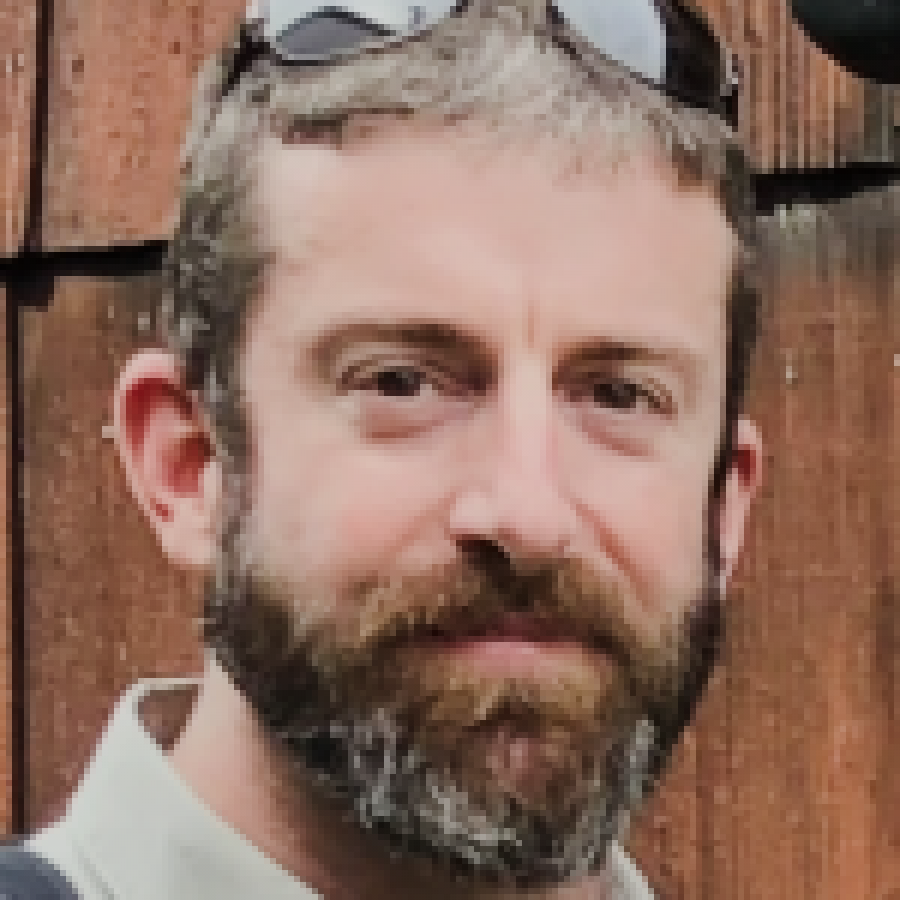
Keynote Speaker: Brett Goldstein
Special Adviser to Vanderbilt's Chancellor
Closing Keynote: Fragility vs. Innovation: A Constant Tension, May 5, 3:00 p.m.
Brett Goldstein is a disruptive innovator known for breaking bureaucratic silos across industries from the Department of Defense to Silicon Valley. He has provided counsel to Cabinet Secretaries and C-suite executives in a variety of content areas, including national security, finance, artificial intelligence, and data analytics. He is also an advisor to several early and mid-stage start-ups. Throughout his career, Goldstein has served in a range of mission-driven leadership roles across government, the private sector, and academia. He is deeply committed to improving government through data and technology.
Goldstein began his technology career at OpenTable, where he helped grow the company from an early-stage startup to a multinational corporation. Following the September 11, 2001, terrorist attacks, he joined the Chicago Police Department where he earned the rank of Commander. He became a leader in Chicago’s municipal government, serving as the first municipal Chief Data Officer in the nation, and later assuming the position of the city’s Chief Information Officer. In these roles, Goldstein was critical in leading successful efforts to use data and technology to improve the lives of Chicago-area residents. To accomplish this, he established one of the premier analytics programs in the country, accelerating Chicago’s growth as a global hub of innovation and technology.
Most recently, he served as the Director of the Defense Digital Service where he ran a team tasked with solving critical technical and national security issues facing the Department of Defense, reporting directly to the Secretary of Defense. He also served as Special Advisor to the United States Department of the Navy where he provided technical expertise on special projects, including overhauling the Navy’s personnel and manpower systems and infrastructure, developing data analytics and machine learning with Joint Special Operations Command (JSOC), and using commercial technology and algorithms to improve force protection for service members in Afghanistan as part of NATO’s Resolute Support Mission.
Goldstein also co-founded and served as Managing Partner of Ekistic Ventures, a venture capital fund dedicated to cultivating a portfolio of technology start-ups that bring new solutions to critical urban problems. Prior to his work at Ekistic, he served as the Chief Technology Officer of GCM Grosvenor, a global investment and advisory firm.
Academically, he has served as a Senior Fellow and Special Advisor for Urban Science at the University of Chicago, and as a Senior Advisor to the Pearson Institute for the Study and Resolution of Global Conflicts. He also held a fellow appointment at the Harvard Kennedy School of Government. He is currently a Special Advisor to the Chancellor at Vanderbilt University.
Goldstein holds a master's degree in Computer Science from the University of Chicago and a master’s degree in Criminal Justice from Suffolk University. He earned his bachelor's degree in Government from Connecticut College. He has received numerous recognitions and awards, and is a sought-after speaker in national and international forums. He lives in Wisconsin with his wife, three children, two dogs, and a fledgling hive of honey bees.
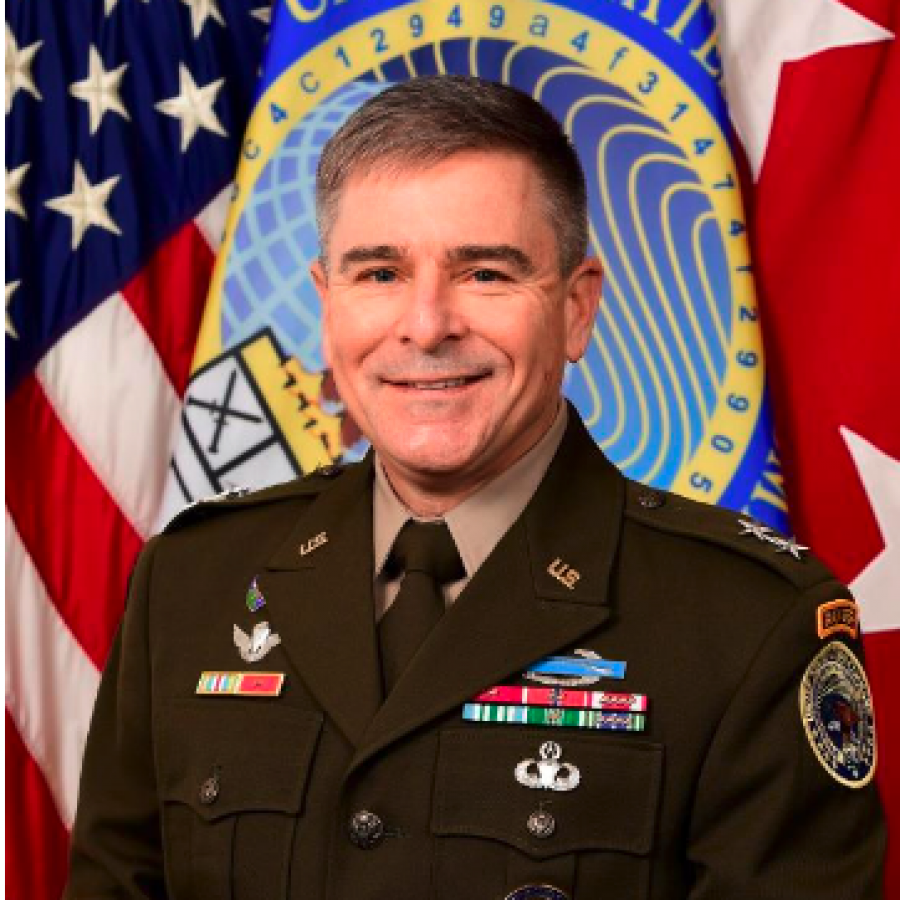
Keynote Speaker: Major General William J. Hartman
Commander, Cyber National Mission Force
Closing Keynote Address with Q&A: Perspectives from the Cyber Front Line: A Keynote from the Commander of the US’s Premier Cyber Force, May 4, 3:45 p.m.
Major General William J. Hartman assumed his present duties as Commander, Cyber National Mission Force in August 2019.
He previously served as the Deputy Commanding General, Joint Force Headquarters Cyber.
A native of Mobile, Alabama, MG Hartman is a Distinguished Military Graduate of the University of South Alabama, where he received his commission
through the Reserve Officer’s Training Corps as an Infantry Officer.
MG Hartman served in multiple positions as an Infantry, Military Intelligence, and Cyberspace Operations Officer, with assignments in the United States, Italy, Germany, the Republic of Korea, Iraq, Afghanistan, and Turkey.
MG Hartman has commanded a company, battalion, brigade and Special Mission Unit, and served as the senior intelligence officer at the battalion and regimental level for the 75th Ranger Regiment, and multiple tours as a SOCOM Joint Task Force J2.
MG Hartman is a graduate of the Infantry Officer Basic Course, the Military Intelligence Officer Advanced Course, Air Command and Staff College, School of Advanced Military Studies, Senior Service College Fellowship with the CIA, and the Joint and Combined Warfighting School. He holds degrees from the University of South Alabama, Air University, and U.S. Army Command and General Staff College.
MG Hartman’s awards and decorations include the Legion of Merit with oak leaf cluster, Bronze Star Medal with oak leaf clusters, the Meritorious Service Medal with oak leaf clusters, the Joint Commendation Medal, the Army Commendation Medal with oak leaf cluster, and the Army Achievement Medal with oak leaf clusters. He is qualified to wear the Ranger Tab, Master Parachutist Badge, the Combat Infantry Badge and the Combat Action Badge. MG Hartman was designated as a Distinguished Member of the 75th Ranger Regiment in 2007.
MG Hartman and his wife are the proud parents of two children.
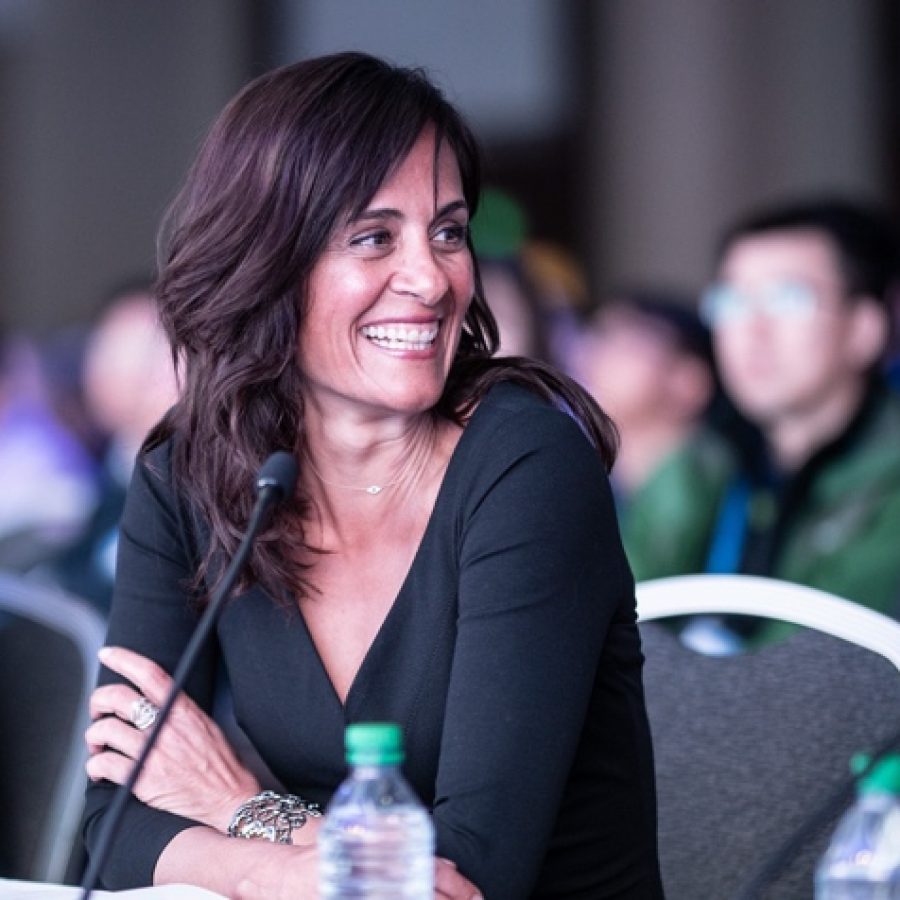
Session Chair: Niloofar Razi Howe
Senior Operating Partner, Energy Impact Partners
Session: Complexities of Cyber Attribution (May 4, 11:00 a.m.)
Niloofar Razi Howe has been an investor, executive and entrepreneur in the technology industry for the past 25 years, with a focus on Cybersecurity for the past 15. Ms. Howe is a Senior Operating Partner at Energy Impact Partners, a VC fund investing in companies shaping the energy landscape of the future. She serves on the Board of Directors of Morgan Stanley Private Bank, NA and Morgan Stanley Bank, NA (Risk Committee, Operations and Technology Committee), Pondurance (as Executive Chair), Tenable (NASDAQ: TENB, Comp Committee), Composecure (NASDAQ: CMPO, Audit Committee), Recorded Future, Swimlane and on the Board of Advisors of Dragos, Enveil, RangeForce, Noetic Cyber, and Picnic Threat. She is a life member at the Council on Foreign Relations and a Senior Fellow, International Security Program at New America, a nonprofit, nonpartisan think tank. Her non-profit work includes serving as Board Chair of IREX, an international development and education organization working in over 120 countries focused on promoting social justice and lasting change, and as a Member of the Board of Trustees of the Smithsonian National Museum of Asian Art. Ms. Howe serves on a number of US government advisory boards including on the Department of Homeland Security’s Cybersecurity Infrastructure Security Agency’s Advisory Council.
Previously, Ms. Howe served as Chief Strategy Officer and SVP of Strategy and Operations at RSA, a global cybersecurity company where she led corporate strategy, corporate development and planning, business development, global program management, business operations, security operations and Federal business development. Prior to RSA, Ms. Howe served as the Chief Strategy Officer of Endgame, Inc., a leading enterprise software security company, where she was responsible for driving market and product strategy, as well as leading marketing, product management, corporate development and planning. Prior to her operating roles, Ms. Howe spent twelve years leading deal teams in private equity and venture capital; first as a Principal at Zone Ventures, an early-stage venture capital firm in Los Angeles, and then as Managing Director at Paladin Capital Group, a Washington DC based private equity fund focused on investing in next generation security companies. Ms. Howe started her professional career as a lawyer with O’Melveny & Myers and as a consultant with McKinsey & Co.
Ms. Howe’s previous board roles include serving on the Board Directors of Initiate Systems (acquired by IBM), Courion Corporation (acquired by K1 Investment), Command Information (acquired by Salient), Safeview (acquired by L-3), Neven Vision (acquired by Google), Global Rights, an international human rights organization, as Chair, Sibley Memorial Hospital (a member of Johns Hopkins Medicine), as chair of its Investment Committee, and Sibley Memorial Hospital Foundation, as Vice Chair. Ms. Howe graduated with honors from Columbia College and holds a JD cum laude from Harvard Law School.
Ms. Howe speaks regularly on national security, cybersecurity, technology, innovation, corporate governance and corporate culture. She also created a TEDx talk entitled “The Gift of Exile” about the long-term opportunities that can arise from the most difficult challenges encountered in childhood for both the individuals who suffer the adversity and the communities that can accept and integrate such individuals. She is a regular judge at innovation competitions including the RSA Conference Innovation Sandbox Competition, the RSA Conference Launchpad Competition, and SINET16 Innovation Competition.

Panelist: Ethan Jackson
Senior Director at Microsoft Research
Session: Leveraging AI and Bio Surveillance to Prevent the Next Pandemic (May 5, 2:00 p.m.)
Dr. Ethan Jackson is Senior Director at Microsoft Research. His work focuses on new sensor networks and cloud-scale AI for biosecurity and pandemic preparedness. Dr. Jackson directs Microsoft Premonition, one of Microsoft’s most advanced health moonshots – aiming to detect the movements of biothreats in the environment, before they disrupt our societies, economies, and industries (microsoft.com/premonition). His team develops robotic platforms that continuously monitor and sample the environment for biothreats, and cloud-scale analytics to detect known and novel threats and discover evolutionary patterns from environmental samples. Under Dr. Jackson's leadership, Microsoft Premonition was named as a key technology in AI-driven population health by the Broadband Commission for Sustainable Development. In 2021, Microsoft Premonition was named as a winner of Fast Company’s industrial "World Changing Ideas Award". He and his team lead collaborations with industry, government, and NGOs, and deeply collaborate with Microsoft’s newly formed “Strategic Missions and Technologies” division – which has the charter to transform cutting edge innovations into next generation capabilities for secure, resilient, and prosperous societies and economies. Dr Jackson’s research background is in cyber-physical and safety-critical systems. He is the creator of the FORMULA system for building domain specific programming languages and enabling formal analysis of complex software, which has been used in large academic and industrial settings. He is also the co-creator of the “P” programming language which allows developers to specify complex systems of communicating asynchronous components, and has been used to design critical components of Microsoft Windows, Microsoft HoloLens, and Microsoft Azure. Ethan joined Microsoft Research in 2007 after receiving his PhD from Vanderbilt University in Computer Science. He received a Bachelor of Engineering (B.E.) degree from the University of Pittsburgh in Computer Engineering in 2003.
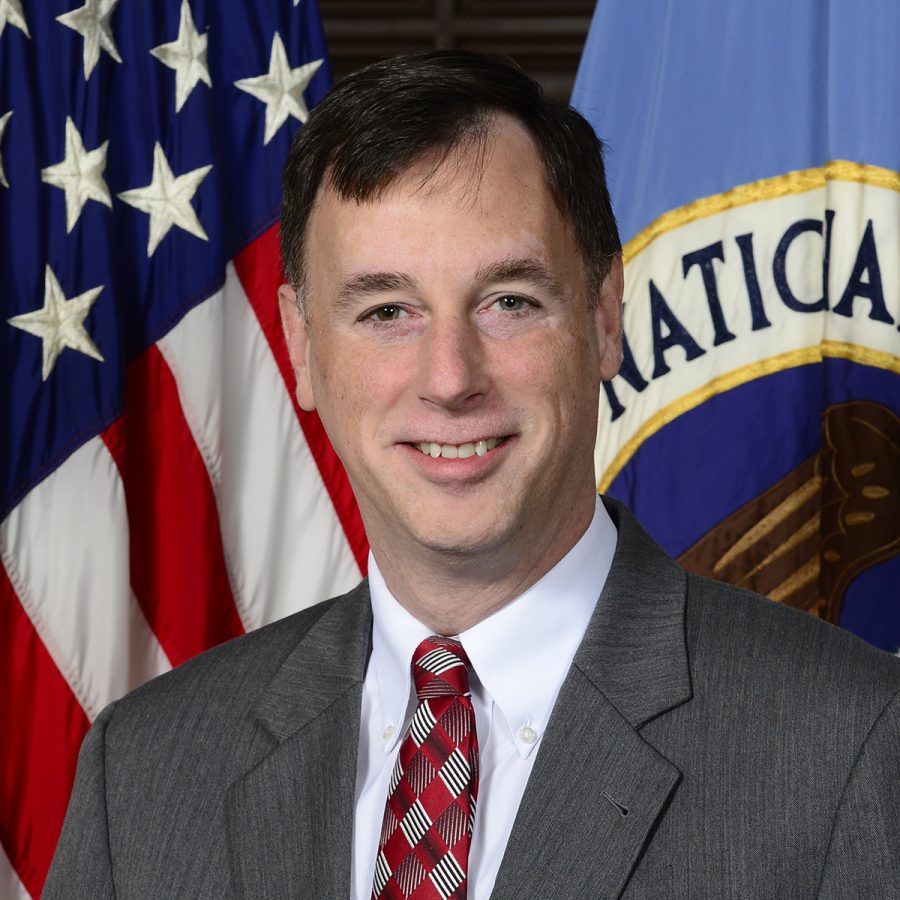
Panelist: Rob Joyce
Director, National Security Agency (NSA), Cybersecurity Directorate
Session: Complexities of Cyber Attribution (May 4, 11:00 a.m.)
Mr. Rob Joyce is the Director of the National Security Agency’s (NSA) Cybersecurity Directorate, which is charged with preventing and eradicating threats to U.S. National Security Systems and critical infrastructure, with a focus on the Defense Industrial Base.
Prior to this role, Mr. Joyce was the Special US Liaison Officer, London. As the senior NSA cryptologic representative in the United Kingdom, he served as the key interlocutor between NSA and GCHQ.
Mr. Joyce has held a wealth of technical and leadership positions across NSA and the broader government, to include serving as Special Assistant to the President and Cybersecurity Coordinator at the White House, Acting Homeland Security Advisor at the White House, and Chief of NSA’s Tailored Access Operations.
Mr. Joyce began his career as an engineer and is a technologist at heart. He received his Bachelor’s Degree in Electrical and Computer Engineering from Clarkson University and earned a Master’s Degree in Electrical Engineering from the John Hopkins University.

Panelist: Xenofon Koutsoukos
Professor and Chair of the Department of Computer Science, Senior Research Scientist with the Institute for Software Integrated Systems, Vanderbilt University
Session: Interdisciplinary Approaches to Modern Conflict (May 4, 1:45 p.m.)
Xenofon Koutsoukos is a Professor and the Chair of the Department of Computer Science and a Senior Research Scientist with the Institute for Software Integrated Systems, Vanderbilt University, Nashville, TN, USA. He was a Member of the Research Staff at the Xerox Palo Alto Research Center (PARC) (2000–2002). His research work is in the area of cyber-physical systems with emphasis on security and resilience, learning-enabled systems, formal methods, distributed algorithms, diagnosis and fault tolerance, and adaptive resource management. He has published more than 300 journal and conference papers and he is co-inventor of four US patents. Prof. Koutsoukos was the recipient of the NSF Career Award in 2004, the Excellence in Teaching Award in 2009 from the Vanderbilt University School of Engineering, and the 2011 NASA Aeronautics Research Mission Directorate (ARMD) Associate Administrator (AA) Award in Technology and Innovation. He was named a Fellow of the IEEE for his contributions to the design of resilient cyber-physical systems.
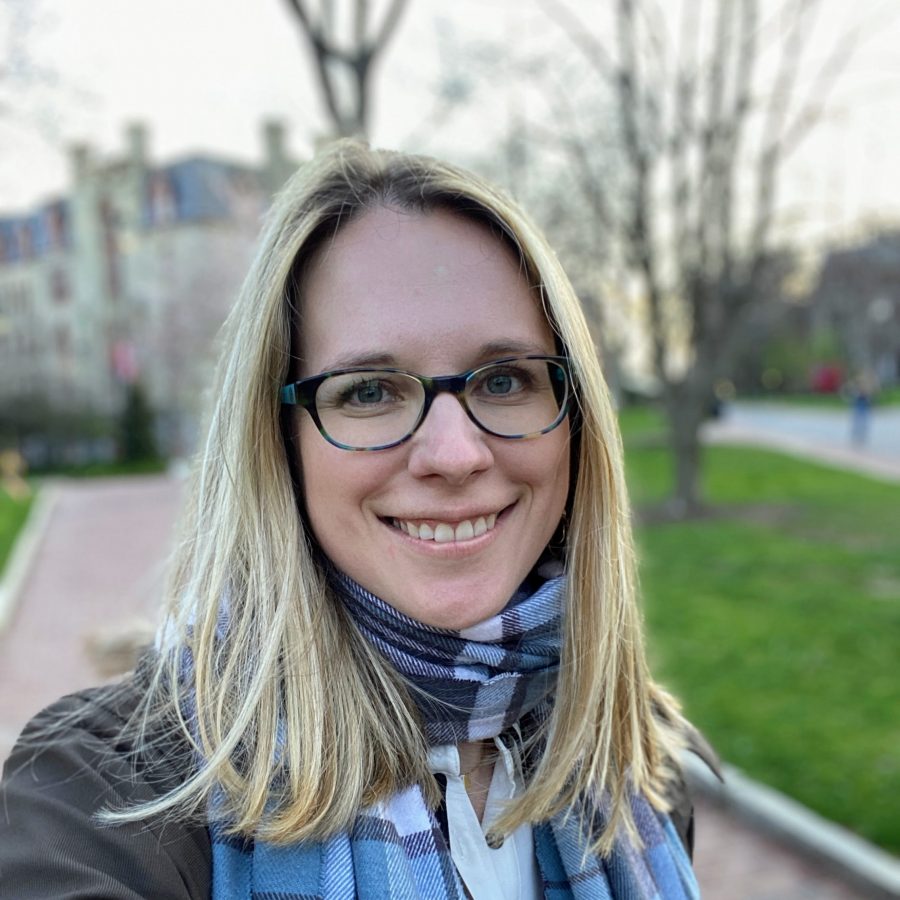
Moderator: Jennifer Larson
Associate Professor of Political Science, Vanderbilt University
Moderator: (May 5)
Jennifer Larson is an Associate Professor of Political Science, the Associate Chair of the Department of Political Science, and a Faculty Affiliate of the Data Science Institute at Vanderbilt University. She is also a Research Affiliate of New York University’s Center for Social Media and Politics. Her research focuses on the ways that social networks help groups sustain peace or facilitate the emergence of conflict, with applications that include protests, armed rebellion, interethnic conflict, weak state governance, and forced migration. Professor Larson’s research has been published in top journals in political science, computer science, and theoretical biology.
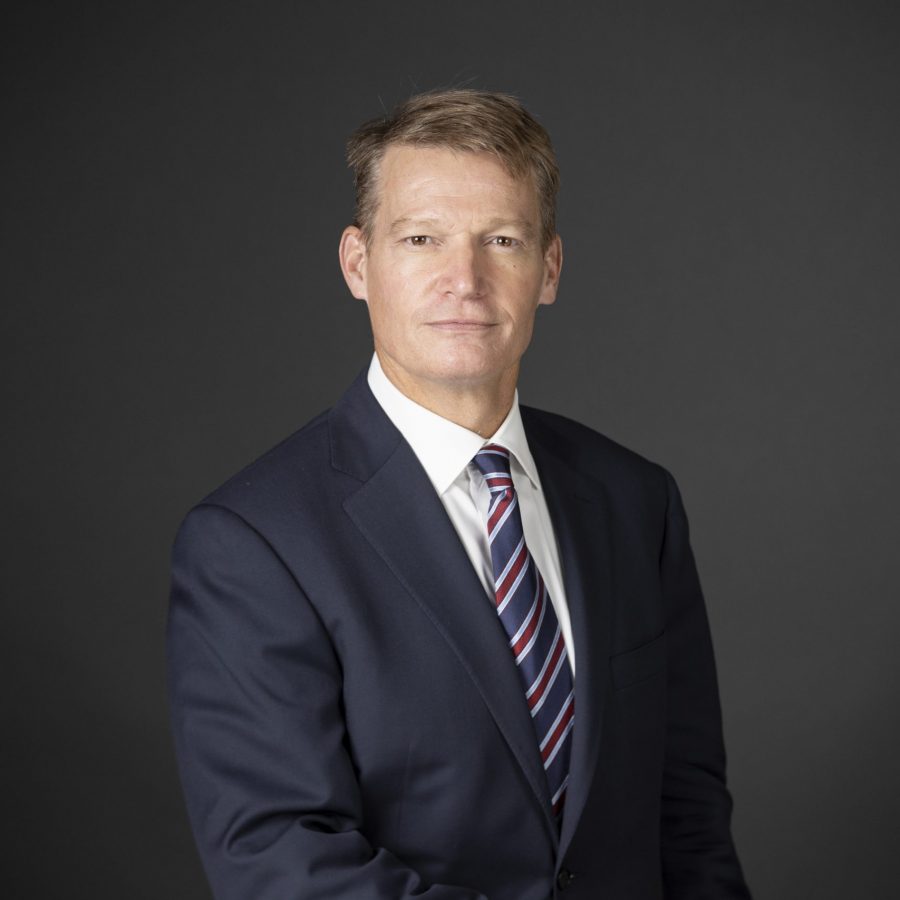
Panelist: Kevin Mandia
Chief Executive Officer and Director, Mandiant
Session: Complexities of Cyber Attribution (May 4, 11:00 a.m.)
Kevin is the Chief Executive Officer and a Director of Mandiant. He was formerly the Chief Executive Officer of FireEye from June 2016 until October 2021, when FireEye announced a corporate name change to Mandiant. Kevin was appointed to the FireEye Board of Directors in February 2016.
Kevin joined FireEye as Senior Vice President and Chief Operating Officer in December 2013, when FireEye acquired Mandiant, the company he founded in 2004. Kevin grew Mandiant to nearly 500 employees and more than $100 million in revenue. The company was widely recognized as the leading provider of security incident management products and services prior to the acquisition and went on to become the core of the highly successful FireEye consulting business.
Kevin’s experience and insight, gained from his work on the front lines of major cyber threats, is routinely requested by corporate directors, executives, and government officials who face serious security challenges. He provides regular commentary and analysis on cyber security issues for major news media and has testified in hearings before the U.S. House and Senate committees.
Kevin began his cyber security career in the United States Air Force, serving as a computer security officer in the 7th Communications Group at the Pentagon and later as a special agent and cyber crime investigator in the Air Force Office of Special Investigations. In the private sector, Kevin held senior positions in the security consulting divisions of Sytex, acquired by Lockheed Martin, and Foundstone, acquired by McAfee.
Kevin holds a B.S. in computer science from Lafayette College and a M.S. in forensic science from The George Washington University.
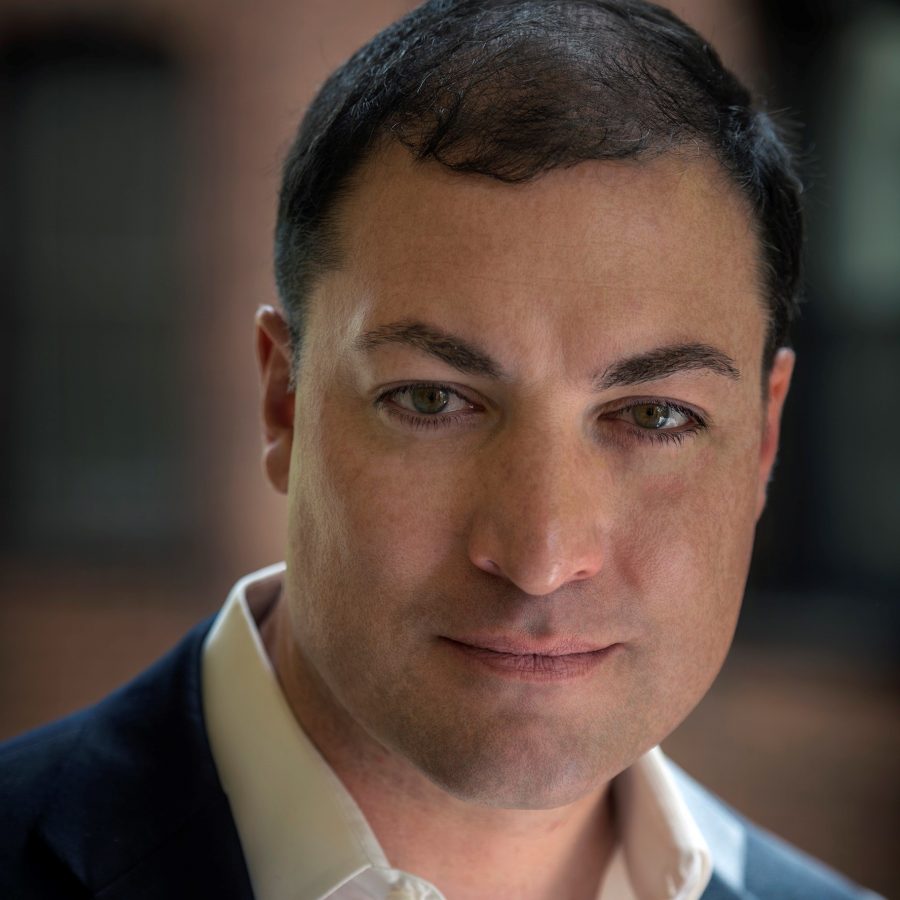
Panelist: Dr. Sean McFate
Professor at National Defense University and author of The New Rules of War: How America Can Win--Against Russia, China, and Other Threats
Session: Entering the Grey Zone: The Changing Face of Conflict, (May 5, 10:30 a.m.)
Dr. Sean McFate is a Senior Fellow at the Atlantic Council, a Washington DC think tank, and a professor at: Georgetown University’s School of Foreign Service, Syracuse University's Maxwell School, and the National Defense University. He is an Advisor to Oxford University’s Centre for Technology and Global Affairs, and a contributing writer for The Hill. His career began as an officer and paratrooper in the U.S. Army’s 82nd Airborne Division, and then he became a private military contractor. His book The Modern Mercenary: Private Armies and What They Mean for World Order (Oxford Univ Press) examines why private warfare has returned and its implications; Foreign Affairs hailed it as "essential reading.” The New Rules of War: Victory in an Era of Durable Disorder has been translated into ten languages and was named a “Book of the Year” by The Economist. McFate has written three novels based on his private military experiences. His latest thriller isHigh Treason. #1 New York Times bestselling author James Patterson said: “Sean McFate just might be the next Tom Clancy, only I think he’s even better.” McFate has written for the New York Times, Wall Street Journal, Washington Post, The Atlantic, Foreign Policy, War on the Rocks, and similar outlets. He has appeared on CNN’s Amanpour, Morning Joe, Fox and Friends, NPR, BBC, Vice/HBO, and The Discovery Channel. McFate holds a BA from Brown University, MPP from the Harvard Kennedy School of Government, and a Ph.D. in international relations from the London School of Economics and Political Science (LSE). More: www.seanmcfate.com
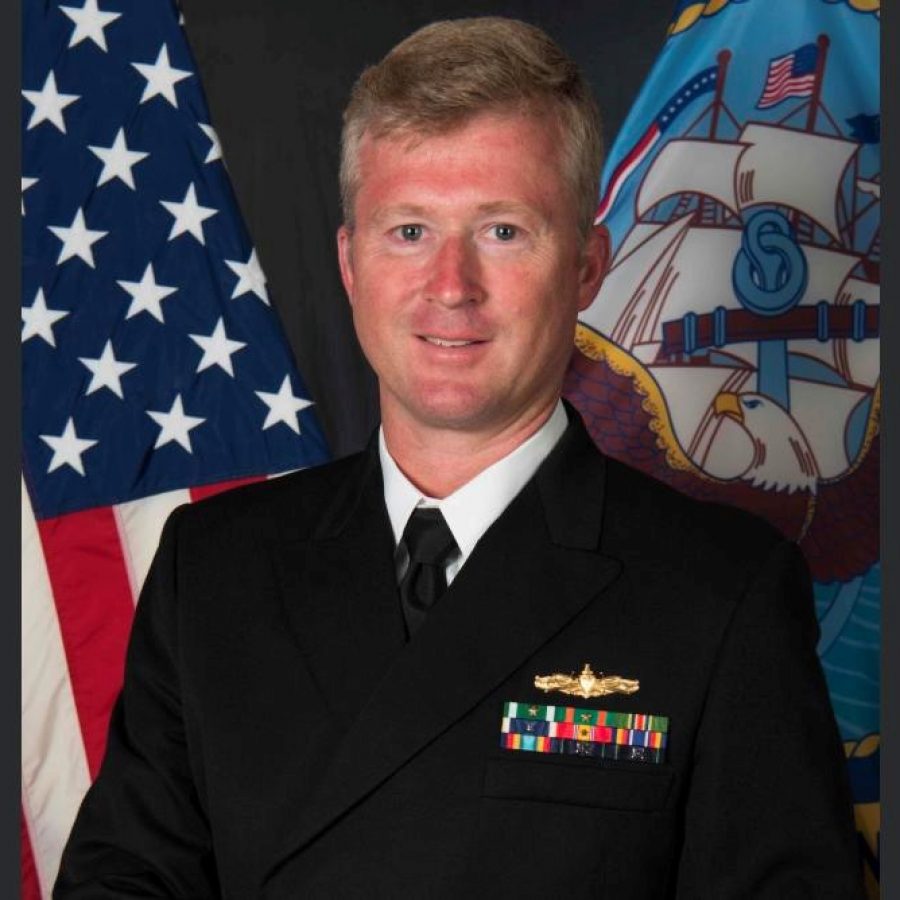
Panelist: Commander Niels Olson
Chief Medical Officer, Defense Innovation Unit
Session: Leveraging AI and Bio Surveillance to Prevent the Next Pandemic (May 5, 2:00 p.m.)
Commander Niels Olson is the Chief Medical Officer at the Defense Innovation Unit in Mountain View, California. In this role, he oversees research programs in machine learning for a broad spectrum of anatomic pathology applications, augmented reality microscopy, artificial intelligence applications in radiology, and distributed sensors in austere environments. Prior to joining DIU, he served as Laboratory Medical Director at Naval Hospital Guam, staff pathologist at Naval Hospital Camp Pendleton, and General Medical Officer for Surface Forces Pacific. He qualified as a surface warfare officer on the frigate USS Wadsworth and qualified as a tactical action officer on the nuclear aircraft carrier USS Nimitz prior to returning to the Naval Academy for a tour on the Commandant's staff. He completed pathology residency at Naval Medical Center San Diego and is board certified in anatomic pathology, clinical pathology, and subspecialty certified in pathology informatics. Dr. Olson earned his MD from the Tulane University School of Medicine and earned his bachelor of science from the US Naval Academy, where he majored in Physics.

Moderator: David Owens
Evans Family Executive Director of The Wond’ry, Professor for the Practice of Management and Innovation, Vanderbilt University
Moderator, (May 4th)
Dr. David A. Owens serves as the Evans Family Executive Director of The Wond’ry, Vanderbilt’s Innovation Center, for which he led the visioning and design. He is Professor of the Practice of Innovation at the Graduate School of Management, with joint appointments in Engineering, Education, and Medicine. Owens received his PhD in a joint program between the School of Engineering and School of Business at Stanford University where he had also earned his BS in electrical engineering and an MS in mechanical engineering / product design.
A registered Professional Engineer, he also has significant industry experience; he was CEO of Griffin Technology, at the time the largest iPhone/iPod accessory maker, and he’s consulted on innovation strategy and design process for NASA, Nissan, Mars, Wrigley, Cisco, LEGO, Bridgestone, and others. As a design engineer at IDEO Product Development, he worked with firms like Apple, Dell, Daimler, and Steelcase.
His research offers a cross-disciplinary study of innovation (and adoption barriers) in business, healthcare and education. He has published in numerous journals and given more than 250 talks internationally. His book Creative People Must Be Stopped! Six Ways We Stop Innovation Without Even Trying is the basis of his MOOC that has enrolled over 150,000 students.

Session Chair: Padma Raghavan
Vice Provost for Research and Professor of Computer Science at Vanderbilt University
Session: Leveraging AI and Bio Surveillance to Prevent the Next Pandemic (May 5, 2:00 p.m.)
Padma Raghavan is the Vice Provost for Research and Professor of Computer Science at Vanderbilt University.
In her faculty role, Raghavan specializes in computational and data sciences and high-performance computing (aka supercomputing), focusing primarily on new algorithms and models to achieve scalable parallelism, increase energy efficiency, and enable fault-tolerant processing. She has authored over one hundred peer-reviewed publications and supervised nearly fifty M.S. and Ph.D. theses. With the support of an NSF CAREER award, Raghavan’s early contributions include the development of the first fully parallel direct linear solvers, an achievement for which she received the Maria Goeppert Meyer Award from the Department of Energy, Argonne National Lab, and the University of Chicago in 2002. Later, Raghavan was named a fellow of the Institute of Electrical and Electronics Engineers in 2013 in recognition of her contributions to the development of energy-efficient supercomputing. Raghavan is also active in the field, serving on editorial boards of the Society for Industrial and Applied Mathematics; the Advisory Boards of the Computing and Information Science and Engineering Directorate and the Office of Advanced Cyberinfrastructure of the National Science Foundation; and committees of the National Academies of Science, Engineering, and Medicine, such as the Technical Advisory Boards for the Army Research Laboratory on Computational Science in 2018 and Information Sciences in 2019.
As Vice Provost for Research, Raghavan oversees the advancement of the university’s research and innovation portfolio, including technology transfer and commercialization spanning the university and medical center as well as the development of strategic partnerships. Such partnerships include Ancora Innovation, a collaboration with Deerfield Management that accelerates the development and delivery of life-changing therapeutics from bench to patient, as well as Army Pathfinder, a program to rapidly advance mission-critical science and technology.
Prior to joining Vanderbilt in 2016, Raghavan served as the Associate Vice President for Research and Strategic Initiatives, the founding Director of the university-wide Institute for Computational and Data Sciences, and Distinguished Professor of Computer Science and Engineering at the Pennsylvania State University.
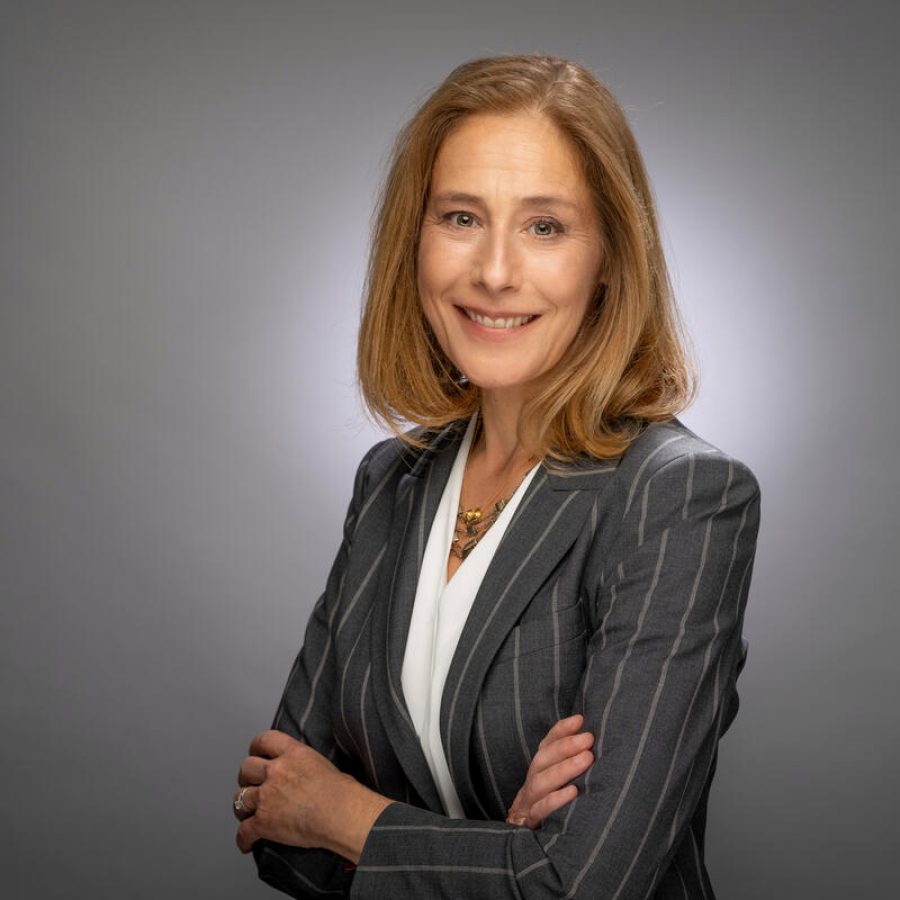
Keynote Speaker: C. Cybele Raver
Provost and Vice Chancellor for Academic Affairs
Keynote Address: Preparing for the “Inevitable Surprise,” May 4, 1:15 p.m.
C. Cybele Raver is Vanderbilt’s provost and vice chancellor for academic affairs.
An esteemed developmental psychologist whose leadership has spanned research, clinical, academic and administrative settings, Raver oversees all faculty, staff, programs and initiatives for Vanderbilt’s 10 schools and colleges. She also leads the university’s research, admissions, student affairs and residential life.
Raver has recently been elected as a fellow of the AAAS and holds a Cornelius Vanderbilt Chair as professor of psychology and human development at Peabody College.
Prior to joining Vanderbilt, Raver was deputy provost at New York University, where she worked to advance interdisciplinary research and provided leadership for faculty and graduate students. She played a key role in the allocation of $3B in annual expenditure for a university serving 58,000 students across global campuses and led a large team aimed at strengthening NYU’s reputation and market position by upping standards of faculty hiring, advancement, tenure and retention for over 5,000 faculty. She was also the provost liaison for several institutes, including NYU’s Center for Data Science, the Courant Institute of Mathematical Sciences and the Robert F. Wagner Graduate School of Public Service, as well as the Social Science Division and Graduate School within the College of Arts & Science.
Throughout her career, Raver has received prestigious awards from the American Psychological Association and the William T. Grant Foundation, among other organizations, and has been granted support from the MacArthur Foundation, the National Institutes of Health, the National Science Foundation and the Spencer Foundation, in which she garnered over $24M in funding. Raver led her own federally-funded research laboratory for over 20 years before joining NYU’s Office of the Provost, and her research focuses primarily on early learning and development within the contexts of poverty and public policy.
At NYU, Raver also held the positions of senior vice provost for academic analytics and graduate academic affairs, and vice provost for faculty and research affairs. In addition, she was the director of the Institute for Education Sciences-funded Predoctoral Interdisciplinary Research Training (IES-PIRT) and the inaugural director of the Institute of Human Development and Social Change.
Raver is also a dedicated teacher. She was a faculty member at NYU for 13 years, most recently as a professor of applied psychology. Previously, she held faculty positions at the University of Chicago’s Harris School of Public Policy and Cornell University’s Department of Human Development.
Beyond her roles in higher education, Raver advises various local and federal government agencies, working with them to promote healthy development and learning among children ranging from birth to the third grade.
A native of New York City, Raver earned her B.A. magna cum laude from Harvard University, where she studied psychology and filmmaking. She later earned her Ph.D. in developmental psychology from Yale University.
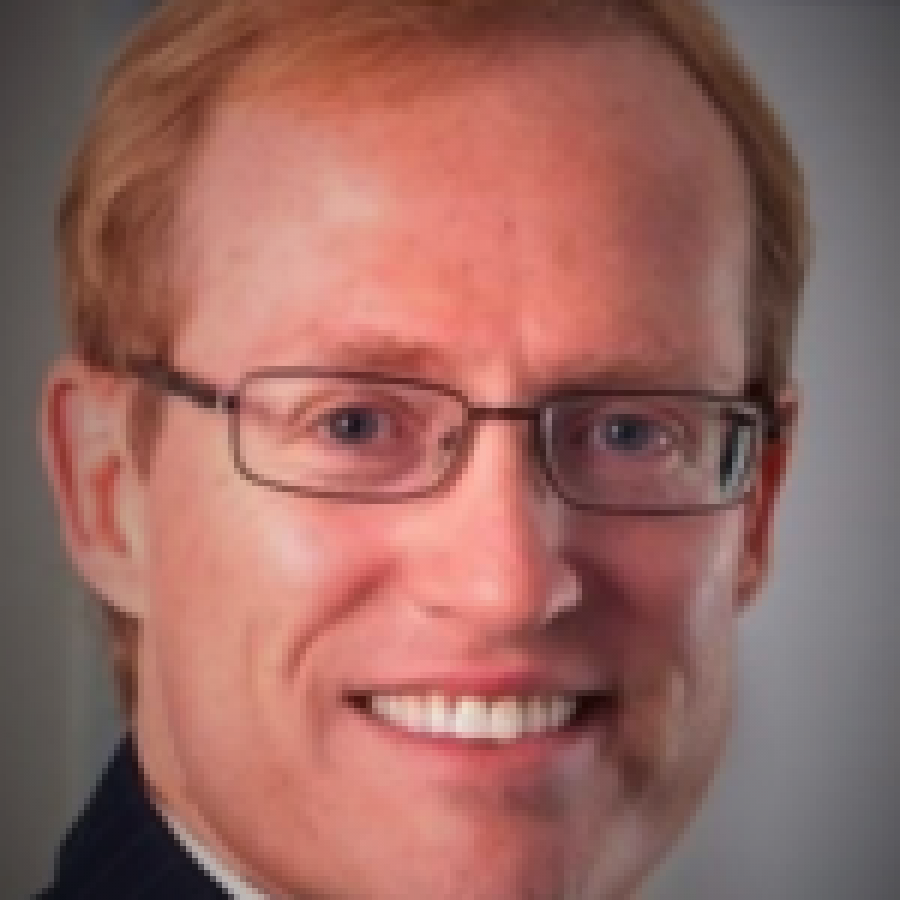
Session Chair: Doug Schmidt
Cornelius Vanderbilt Professor of Computer Science, Associate Provost for Research Development and Technologies, Co-Chair of the Data Science Institute, and Senior Researcher at the Institute for Software Integrated Systems at Vanderbilt University
Session: Entering the Grey Zone: The Changing Face of Conflict, (May 5, 10:30 a.m.)
Dr. Douglas C. Schmidt is the Cornelius Vanderbilt Professor of Computer Science, Associate Provost for Research Development and Technologies, Co-Chair of the Data Science Institute, and a Senior Researcher at the Institute for Software Integrated Systems at Vanderbilt University. He is also a Visiting Scientist at the Software Engineering Institute (SEI) at Carnegie Mellon University (CMU), where he served as the Chief Technology Officer from 2010 to 2012.
Dr. Schmidt's research covers a range of software-related topics, including patterns, optimization techniques, and empirical analyses of frameworks and model-driven engineering tools that facilitate the development of mission-critical middleware for distributed real-time embedded (DRE) systems and mobile cloud computing applications running over wireless/wired networks and embedded system interconnects. He has published 650+ technical papers and books that have been cited 44,900+ times, his h-index is 87, and he has mentored and graduated over 40 Ph.D. and Masters students.
From 2010-2014 Dr. Schmidt served a member of the Air Force Scientific Advisory Board, where he served as Vice Chair of a study on Cyber Situational Awareness for Air Force mission operations. From 2000 to 2003 Dr. Schmidt served as a Deputy Office Director and a Program Manager at DARPA, where he led the national research and development effort on middleware for distributed real-time and embedded (DRE) systems.
Dr. Schmidt received B.A. and M.A. degrees in Sociology from the College of William and Mary in Williamsburg, Virginia, and an M.S. and a Ph.D. in Computer Science from the University of California, Irvine (UCI) in 1984, 1986, 1990, and 1994, respectively.
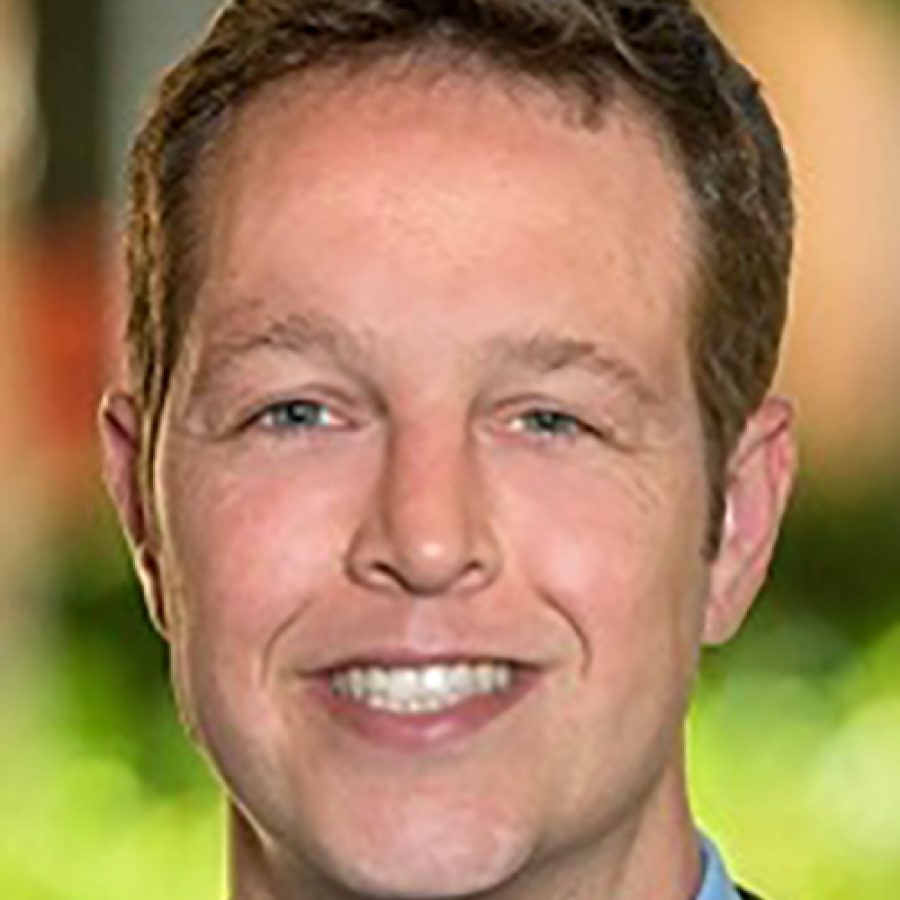
Panelist: Peter Schram
Assistant Professor, Vanderbilt University’s Department of Political Science
Session: Entering the Grey Zone: The Changing Face of Conflict, (May 5, 10:30 a.m.)
Peter Schram is an Assistant Professor at Vanderbilt University’s Department of Political Science. His research examines the organizational economics of insurgent groups and the role of low-level conflict in international relations. Before this, Dr. Schram worked for one year at UCSD's Cross Domain Deterrence Project. He received a Masters of Economics from Stanford University and a Ph.D. in Political Economics from Stanford University’s Graduate School of Business.

Panelist: Suzanne Smalley
CyberScoop Reporter Covering Intelligence, Disinformation, and Cyber Command
Session: Complexities of Coverage in Modern Conflict and Emerging Threats (May 5, 12:00 p.m.)
Suzanne Smalley covers intelligence, disinformation, and Cyber Command for CyberScoop. She previously worked at Yahoo News, where she covered the Saudi regime and its use of Pegasus, among other topics. Prior to that Suzanne worked at Newsweek as a national correspondent, a job she came to after spending three years covering police and crime for The Boston Globe. Prior to her work at the Globe, Suzanne completed her initial stint at Newsweek, where she covered the 2004 presidential campaign as part of Newsweek’s Campaign Special Project Team. The National Magazine Awards recognized the project, awarding Newsweek the prestigious best single-topic honor. Suzanne received her undergraduate degree from Georgetown University and a masters degree in journalism from Northwestern University’s Medill School.

Panelist: Dr. Janos Sztipanovits
E. Bronson Ingram Distinguished Professor of Engineering at Vanderbilt University and John Von Neumann professor of the Budapest University of Technology and Economy
Session: Leveraging AI and Bio Surveillance to Prevent the Next Pandemic (May 5, 2:00 p.m.)
Dr. Janos Sztipanovits is currently the E. Bronson Ingram Distinguished Professor of Engineering at Vanderbilt University and John Von Neumann professor of the Budapest University of Technology and Economy. He is founding director of the Institute for Software Integrated Systems. Between 1999 and 2002, he worked as program manager and deputy director of DARPA Information Technology Office. He was member of the US Air Force Science Advisory Board between 2006 and 2010 and the Board on Army RDT&E, Systems Acquisition, and Logistics (BARSL) between 2019 and 2021. He co-authored two books and over 350 papers in model-based design, model-integrated computing, design automation for cyber-physical systems, security and autonomous systems. He is Fellow of the IEEE and external member of the Hungarian Academy of Sciences.
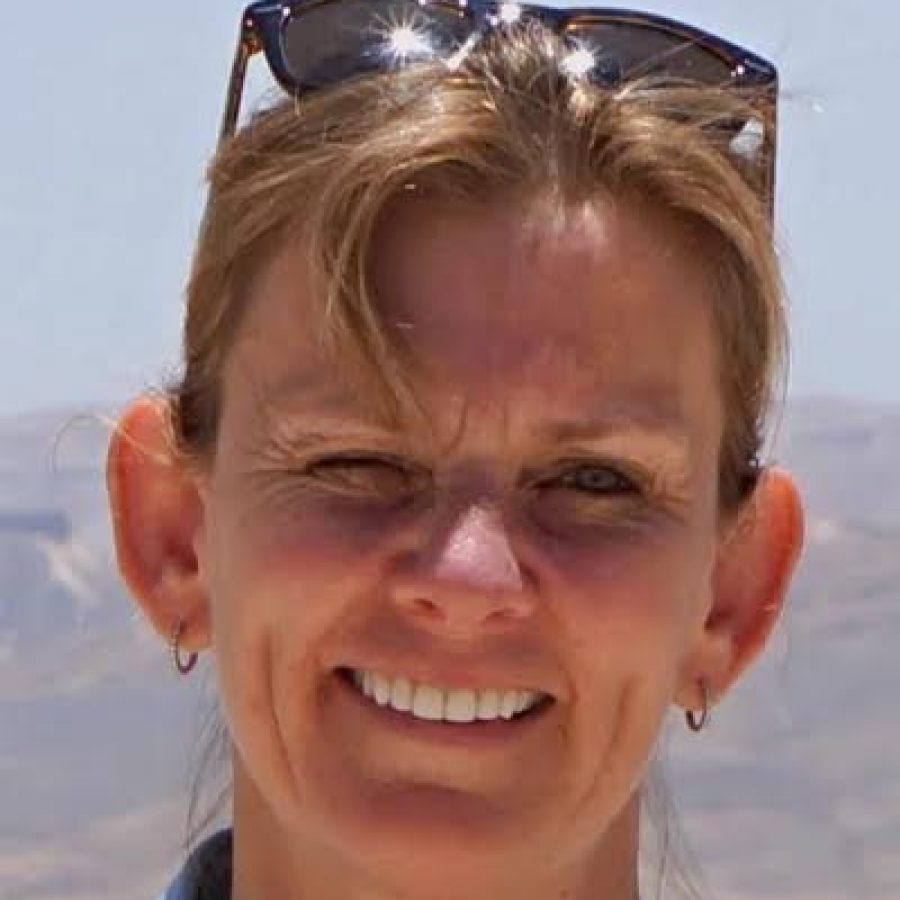
Panelist: Dina Temple-Raston
Host and executive producer of the Click Here podcast, senior correspondent at The Record
Session: Complexities of Coverage in Modern Conflict and Emerging Threats (May 5, 12:00 p.m.)
Dina Temple-Raston is the host and executive producer of the Click Here podcast as well as a senior correspondent at The Record. She previously served on NPR’s Investigations team focusing on breaking news stories and national security, technology, and social justice and hosted and created the award-winning Audible Podcast “What Were You Thinking.” She was a longtime foreign correspondent for Bloomberg News in China and served as Bloomberg’s White House correspondent during the Clinton Administration. She is the author of four books, including “The Jihad Next Door: Rough Justice in the Age of Terror,” and “A Death in Texas: A Story of Race, Murder and a Small Town’s Struggle for Redemption.”
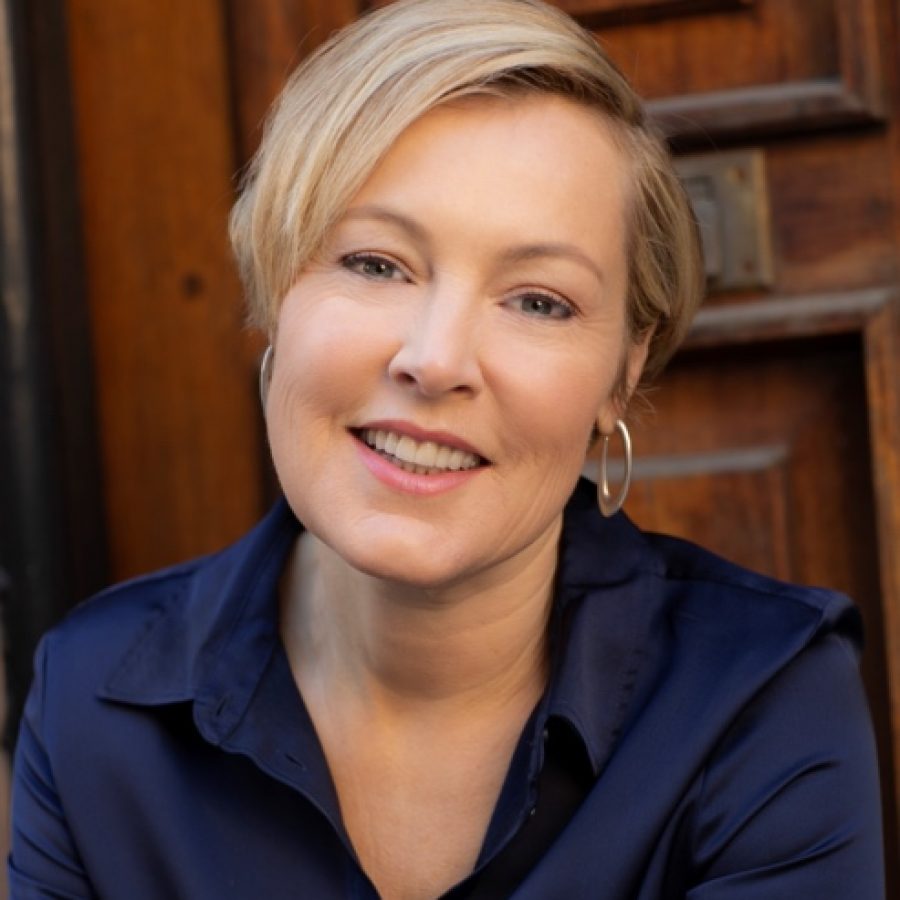
Session Chair: Gillian Tett
Chair of the Editorial Board and Editor-at-Large, US Financial Times
Session: Interdisciplinary Approaches to Modern Conflict (May 4, 1:45 p.m.)
Gillian Tett serves as the chair of the editorial board and editor-at-large, US of the Financial Times. She writes weekly columns, covering a range of economic, financial, political and social issues. She is also the co-founder of FT Moral Money, a twice weekly newsletter that tracks the ESG revolution in business and finance which has since grown to be a staple FT product. In 2020 and 2021, Moral Money won the SABEW best newsletter.
Previously, Tett was the FT’s US managing editor from 2013 to 2019. She has also served as assistant editor for the FT’s markets coverage, capital markets editor, deputy editor of the Lex column, Tokyo bureau chief, Tokyo correspondent, London-based economics reporter and a reporter in Russia and Brussels.
Tett is the author of The Silo Effect, which looks at the global economy and financial system through the lens of cultural anthropology. She also authored Fool’s Gold: How Unrestrained Greed Corrupted a Dream, Shattered Global Markets and Unleashed a Catastrophe, a 2009 New York Times bestseller and Financial Book of the Year at the inaugural Spear’s Book Awards. Additionally, she wrote the 2003 book Saving the Sun: A Wall Street Gamble to Rescue Japan from its Trillion Dollar Meltdown. Her latest book, Anthro-Vision, A New Way to See Life and Business came out in June 2021.
Tett has received honorary degrees from the University of Exeter, the University of Miami, St Andrew’s, London University (Goldsmiths), Carnegie Mellon, Baruch and an honorary doctorate from Lancaster University in the UK.
In 2014, Tett won the Royal Anthropological Institute Marsh Award and was named Columnist of the Year at the British Press Awards. Her 2012 article “Madoff spins his story” won the SABEW Award for best feature article. Other awards include a President’s Medal by the British Academy (2011), being recognized as Journalist of the Year (2009) and Business Journalist of the Year (2008) by the British Press Awards, and as Senior Financial Journalist of the Year (2007) by the Wincott Awards. In 2017, Tett won the commentator of the year from Editorial Intelligence.
Before joining the Financial Times in 1993, Tett was awarded a PhD in social anthropology from Cambridge University based on field work in the former Soviet Union. While pursuing the PhD, she freelanced for the FT and the BBC. She is a graduate of Cambridge University.

Panelist: Jules White
Associate Dean of Strategic Learning Programs in the School of Engineering and Associate Professor of Computer Science in the Dept. of Computer Science at Vanderbilt University
Session: Complexities of Cyber Attribution (May 4, 11:00 a.m.)
Dr. Jules White is Associate Dean of Strategic Learning Programs in the School of Engineering and Associate Professor of Computer Science in the Dept. of Computer Science at Vanderbilt University. He is a National Science Foundation CAREER Award recipient. His research has won multiple Best Paper Awards. He has also published over 150 papers. Dr. White’s research focuses on cyber-security and mobile / cloud computing in domains ranging from healthcare to manufacturing. His research has been licensed and transitioned to industry, where it won an Innovation Award at CES 2013, attended by over 150,000 people, was a finalist for the Technical Achievement at Award at SXSW Interactive, and was a top 3 for mobile in the Accelerator Awards at SXSW 2013. He has raised over $12 million in venture backing for his startup companies. His research is conducted through the Mobile Application computinG, optimizatoN, and secUrity Methods (MAGNUM) Group at Vanderbilt University, which he directs.
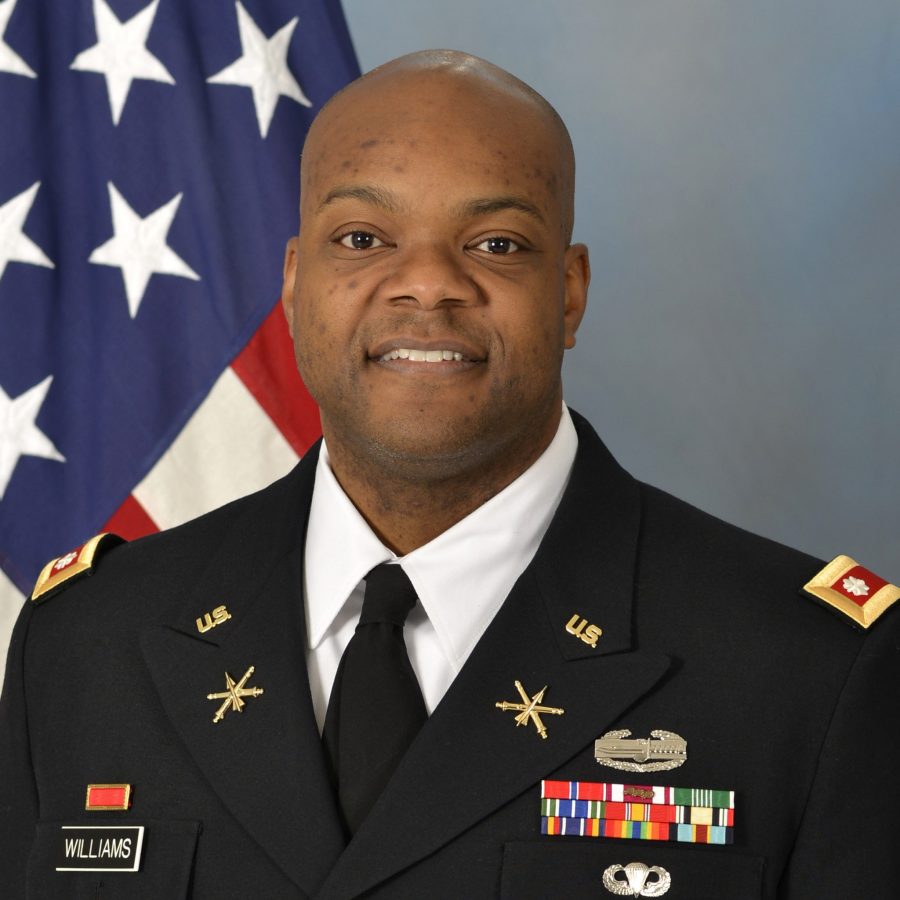
Panelist: Lieutenant Colonel John Williams II
Army Futures Command Field Assistance Science & Technology Director for USINDOPACOM
Session: Leveraging AI and Bio Surveillance to Prevent the Next Pandemic (May 5, 2:00 p.m.)
LTC John M. Williams II is an Army acquisition officer with nearly 18 years of service on active duty. His early career included leading Soldiers in adopting new technology in combat operations, training warfighters on new systems in preparation for deployment, and educating future officers as faculty within the Department of Chemistry & Life Sciences at USMA. Since transitioning to the Army Acquisition Corps, LTC Williams has led teams in developing, procuring, and fielding advanced virtual training systems, as well as leading Science & Technology Portfolio Integration at the DEVCOM Chemical Biological Center, with emphasis on Army modernization, and CBRNE defense. LTC Williams recently earned a Ph.D. from the Vanderbilt Interdisciplinary Material Science Program, under the direction of Dr. David Cliffel, and will serve as the Army Futures Command Field Assistance Science & Technology Director for USINDOPACOM. In addition to the recently completed degree from Vanderbilt, LTC Williams is DAWIA certified level III in Program Management, Level I in Engineering, earned a BS in Chemistry from USMA, an MA in Leadership from UT El Paso, and an MS in Biomedical Engineering from UNC-Chapel Hill.